#they are lesbian lovers also who sort through the differences in their cultures
Note
Oh and this song is literally about a vampire haha
LETS GOOOO MORE VAMPIRE MUSIC ah i can really never have enough. love me some vampire music :thumbs_up:
#people asking me things#the lyrics in this one were silly it reminded me of a small little story idea i came up with earlier#it's like lesbian vampires + royalty + ritualistic sacrifice of human flesh to the vampire queen once every full moon#the vampire queen is so used to having the sacrificial humans go out kicking and screaming#but this new one comes along and she is straight up like “omg wait ur so hot actually pls bite me”#and the vampire is queen is like “ur funny. i'm keeping you”#the human is so endearingly cringefail but so is the vampire queen just in a girlboss way#they are lesbian lovers also who sort through the differences in their cultures#(our human friend does not enjoy watching the sacrificial feastings. it is not pleasant watching humans getting ripped apart)#(but also she kinda wishes it was her LMAO)#i don't really have a conflict but if i can settle upon one i might actually turn it into a thing maybe#right now it's just a silly little idea in my head hehe#(it's also definitely not a self insert nope not at all why would you ever think that)
3 notes
·
View notes
Photo
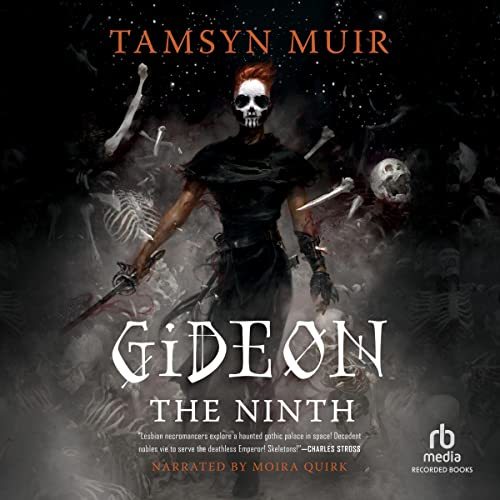
Gideon the Ninth by Tamsyn Muir is the first book of The Locked Tomb series about, “Lesbian necromancers explore a haunted gothic palace in space! Decadent nobles vie to serve the deathless emperor! Skeletons!”
Set in a world where a 10.000-year-old immortal Necromancer rules over nine planets, lead by nine houses who practise a different branch of necromancy, Gideon Nav belongs to the Ninth house, a death cult forever sentenced to guard the locked tomb of the immortal Emperor’s greatest enemy. Gideon is not a member of the Ninth House, but an indentured servant who has made 86 escape attempts over the years to no avail.
One day the Emperor invites each of the Great House heirs to compete in a series of trials to become Lyctors, immortal necromancers and the Emperor’s right hand. Each Necromancer can only bring a sword-wielding bodyguard with them, and unfortunately for the reverend daughter of Drearburhr, Harrowhark Nonagesimus, after her chosen cavalier abandons his post, Gideon is the best swordswoman they have left.
The story takes place in the Canaan Mansion of the First House, where our two main leads meet the other House Heirs and their cavaliers, given little to no instructions by the elderly priests who reside within the mansion about how they are supposed to gain immortality and are given free rein to go into any room that is not locked. Harrowhark is more than happy to face the trials by herself but quickly learns that each room requires the necromancer and cavalier to work together to obtain a key that will unlock the next room.
Things go south very quickly though when one of the Houses is found dead and the book becomes a murder mystery where the Heirs cannot contact anyone outside the decaying mansion until the trials are complete, and uncertain if there is a monster hiding somewhere in the manor or if one of the other Houses is trying to get rid of the competition...
Gideon the Ninth is a charming gothic horror story with a lot of sarcasm and pop culture references. Gideon is a good-hearted, but crass, sunglasses-wearing swordswoman, who loves flexing her biceps and reading porn mags. Harrow the Ninth is a skull-face-painted nun and necromancer prodigy, the last of her bloodline, hoping to achieve Lyctorhood to rebuild the Ninth House to its once former glory, and has hated Gideon’s guts ever since they were kids.
Classic enemies to lovers.
Confined to the First House for the majority of the first book, we learn very little about the larger universe but get a feel for this culture and its relationship with death through the Nine Houses' interactions with each other. The only downside to this setting is that it’s very easy to forget this is a sci-fi series since all the characters are isolated from the comforts of home and no one has any sort of electronic device that could help them get in contact with the outside world. No one carries a gun, everything is done with magic, the mansion is ancient in design, and all the servants are animated skeletons. Hopefully, we visit other planets in the next book.
There was a point in the story where I was wondering why any of the heirs needed a bodyguard when it's made very clear their magic can easily overpower the average person. Other than the heirs not wanting to get their hands dirty and Harrow desperately needing someone to talk to, I couldn’t figure out their purpose in the trials or why one of the conditions for becoming a cavalier was that they are only allowed to carry rapiers when many of the bodyguards are not suited what that kind of blade, especially Gideon who was trained to wield a two-handed sword. There is a payoff for this later and it's genius when you figure out why.
Limiting the story to one type of magic system also expands on what you can do with the subject. Harrow is the most traditional type of necromancer we’re familiar with; able to summons hordes of skeleton armies to do her bidding, but other branches get very creative with the concept. There is a house that can manipulate dead flesh and body tissue, another house that can commune with dead spirits, and a house that can read the energy signatures of objects and draw in that spirit energy to power themselves. Each house tackles the trial in different ways and there is political drama over what they see as disrespectful or acceptable.
Great series. Great first book. Great twist ending. Did not see it coming. Can’t wait to read book 2.
#charl's book journey#I'm continuing my last year's new years resolution of reading one book a month#and I'm learning very quickly book fandoms do not exist#so you can imagine my excitement that this series has such a loving community
0 notes
Note
Hi, Dr. Reames! I just read your take on Song of Achilles and it got me thinking. Do you think there might be a general issue with the way women are written in mlm stories in general? Because I don't think it's the first time I've seen something like this happen.
And my next question is, could you delve further into this thing you mention about modern female authors writing women? How could we, beginner female writers, avoid falling into this awful representations of women in our writing?
Thank you for your time!
[It took a while to finish this because I wrote, re-wrote, and re-wrote it. Still not sure I like it, but I need to let it go. It could be 3xs as long.]
I’ll begin with the second half of the question, because it’s simpler. How do we, as women authors, avoid writing women in misogynistic ways?
Let me reframe that as how can we, as female authors, write negative (even quite nasty) female characters without falling into misogynistic tropes? Also, how can we write unsympathetic, but not necessarily “bad” female characters, without it turning misogynistic?
Because people are people, not genders, not all women are good, nor all men bad. Most of us are a mix. If we should avoid assuming powerful women are all bitches, by the same token, some women are bitches (powerful or not).
ALL good characterization comes down to MOTIVE. And careful characterization of minority characters involves fair REPRESENTATION. (Yes, women are a minority even if we’re 51% of the population.)
The question ANY author must ask: why am I making this female character a bitch? How does this characterization serve the larger plot and/or characterization? WHY is she acting this way?
Keep characters complex, even the “bad guys.” Should we choose to make a minority character a “bad guy,” we need to have a counter example—a real counter, not just a token who pops in briefly, then disappears. Yeah, maybe in an ideal world we could just let our characters “be,” but this isn’t an ideal world. Authors do have an audience. I’m a lot less inclined to assume stereotyping when we have various minority characters with different characterizations.
By the same token, however, don’t throw a novel against the wall if the first minority character is negative. Read further to decide if it’s a pattern. I’ve encountered reviews that slammed an author for stereotyping without the reader having finished the book. I’m thinking, “Uh…if you’d read fifty more pages….” Novels have a developmental arc. And if you’ve got a series, that, too, has a developmental arc. One can’t reach a conclusion about an author’s ultimate presentation/themes until having finished the book, or series.*
Returning to the first question, the appearance of misogyny depends not only on the author, but also on when she wrote, even why she’s writing. Authors who are concerned with matters such as theme and message are far more likely to think about such things than those who write for their own entertainment and that of others, which is more typical of Romance.
On average, Romance writers are a professionalized bunch. They have national and regional chapters of the Romance Writers of America (RWA), newsletters and workshops that discuss such matters as building plot tension, character dilemmas, show don’t tell, research tactics, etc. Yet until somewhat recently (early/mid 2010s), and a series of crises across several genres (not just Romance), treatment of minority groups hadn’t been in their cross-hairs. Now it is, with Romance publishers (and publishing houses more generally) picking up “sensitivity readers” in addition to the other editors who look at a book before its publication.
Yet sensitivity readers are hired to be sure lines like “chocolate love monkey” do not show up in a published novel. Yes, that really was used as an endearment for a black man in an M/M Romance, which (deservedly) got not just the author but the publishing house in all sorts of hot water. Yet misogyny, especially more subtle misogyny in the way of tropes, is rarely on the radar.
I should add that I wouldn’t categorize The Song of Achilles as an M/M historical Romance. In fact, I’m not sure what to call novels about myths, as myths don’t exist in actual historical periods. When should we set a novel about the Iliad? The Bronze Age, when Homer said it happened, or the Greek Dark Age, which is the culture Homer actually described? They’re pretty damn different. I’d probably call The Song of Achilles an historical fantasy, especially as mythical creatures are presented as real, like centaurs and god/desses.
Back to M/M Romance: I don’t have specific publishing stats, but it should surprise no one that (like most of the Romance genre), the vast bulk of authors of M/M Romance are women, often straight and/or bi- women. The running joke seems to be, If one hot man is good, two hot men together are better. 😉 Yes, there are also trans, non-binary and lesbian authors of M/M Romance, and of course, bi- and gay men who may write under their own name or a female pseudonym, but my understanding is that straight and bi- cis-women authors outnumber all of them.
Just being a woman, or even a person in a female body, does not protect that author from misogyny. And if she’s writing for fun, she may not be thinking a lot about what her story has to “say” in its subtext and motifs, even if she may be thinking quite hard about other aspects of story construction. This can be true of other genres as well (like historical fantasy).
What I have observed for at least some women authors is the unconscious adoption of popular tropes about women. Just as racism is systemic, so is sexism. We swim in it daily, and if one isn’t consciously considering how it affects us, we can buy into it by repeating negative ideas and acting in prescribed ways because that’s what we learned growing up. If writing in a symbol-heavy genre such as mythic-driven fantasy, it can be easy to let things slip by—even if they didn’t appear in the original myth, such as making Thetis hostile to Patroklos, the classic Bitchy Mother-in-Law archetype.
I see this sort of thing as “accidental” misogyny. Women authors repeat unkind tropes without really thinking them through because it fits their romantic vision. They may resent it and get defensive if the trope is pointed out. “Don’t harsh my squee!” We can dissect why these tropes persist, and to what degree they change across generations—but that would end up as a (probably controversial) book, not a blog entry. 😊
Yet there’s also subconscious defensive misogyny, and even conscious/semi-conscious misogyny.
Much debate/discussion has ensued regarding “Queen Bee Syndrome” in the workplace and whether it’s even a thing. I think it is, but not just for bosses. I also would argue that it’s more prevalent among certain age-groups, social demographics, and professions, which complicates recognizing it.
What is Queen Bee Syndrome? Broadly, when women get ahead at the expense of their female colleagues who they perceive as rivals, particularly in male-dominated fields, hinging on the notion that There Can Be Only One (woman). It arises from systemic sexism.
Yes, someone can be a Queen Bee even with one (or two) women buddies, or while claiming to be a feminist, supporting feminist causes, or writing feminist literature. I’ve met a few. What comes out of our mouths doesn’t necessarily jive with how we behave. And ticking all the boxes isn’t necessary if you’re ticking most of them. That said, being ambitious, or just an unpleasant boss/colleague—if its equal opportunity—does not a Queen Bee make. There must be gender unequal behavior involved.
What does any of that have to do with M/M fiction?
The author sees the women characters in her novel as rivals for the male protagonists. It gets worse if the women characters have some “ownership” of the men: mothers, sisters, former girlfriends/wives/lovers. I know that may sound a bit batty. You’re thinking, Um, aren’t these characters gay or at least bi- and involved with another man, plus—they’re fictional? Doesn’t matter. Call it fantasizing, authorial displacement, or gender-flipped authorial insert. We authors (and I include myself in this) can get rather territorial about our characters. We live in their heads and they live in ours for months on end, or in many cases, years. They’re real to us. Those who aren't authors often don’t quite get that aspect of being an author. So yes, sometimes a woman author acts like a Queen Bee to her women characters. This is hardly all, or even most, but it is one cause of creeping misogyny in M/M Romance.
Let’s turn to a related problem: women who want to be honorary men. While I view this as much more pronounced in prior generations, it’s by no means disappeared. Again, it’s a function of systemic sexism, but further along the misogyny line than Queen Bees. Most Queen Bees I’ve known act/react defensively, and many are (imo) emotionally insecure. It’s largely subconscious. More, they want to be THE woman, not an honorary man.
By contrast, women who want to be honorary men seem to be at least semi-conscious of their misogyny, even if they resist calling it that. These are women who, for the most part, dislike other women, regard most of “womankind” as either a problem or worthless, and think of themselves as having risen above their gender.
And NO, this is not necessarily religious—sometimes its specifically a-religious.
“I want to be an honorary man” women absolutely should NOT be conflated with butch lesbians, gender non-conformists, or frustrated FTMs. That plays right into myths the queer community has combated for decades. There’s a big difference between expressing one’s yang or being a trans man, and a desire to escape one’s womanhood or the company of other women. “Honorary men” women aren’t necessarily queer. I want to underscore that because the concrete example I’m about to give does happen to be queer.
I’ve talked before about Mary Renault’s problematic portrayal of women in her Greek novels (albeit her earlier hospital romances don’t show it as much). Her own recorded comments make it clear that she and her partner Julie Mullard didn’t want to be associated with other lesbians, or with women much at all. She was also born in 1905, living at a time when non-conforming women struggled. If extremely active in anti-apartheid movements in South Africa, Renault and Mullard were far less enthused by the Gay Rights Movement. Renault even criticized it, although she wrote back kindly to her gay fans.
The women in Renault’s Greek novels tend to be either bitches or helpless, reflecting popular male perceptions of women: both in ancient Greece and Renault’s own day. If we might argue she’s just being realistic, that ignores the fact one can write powerful women in historical novels and still keep it attitudinally accurate. June Rachuy Brindel, born in 1919, author of Ariadne and Phaedra, didn’t have the same problem, nor did Martha Rofheart, born in 1917, with My Name is Sappho. Brindel’s Ariadne is much more sympathetic than Renault’s (in The King Must Die).
Renault typically elevates (and identifies with) the “rational” male versus the “irrational” female. This isn’t just presenting how the Greeks viewed women; it reflects who she makes the heroes and villains in her books. Overall, “good” women are the compliant ones, and the compliant women are tertiary characters.
Women in earlier eras who were exceptional had to fight multiple layers of systemic misogyny. Some did feel they had to become honorary men in order to be taken seriously. I’d submit Renault bought into that, and it (unfortunately) shows in her fiction, as much as I admire other aspects of her novels.
So I think those are the three chief reasons we see women negatively portrayed in M/M Romance (or fiction more generally), despite being written by women authors.
------------------------------------
*Yeah, yeah, sometimes it’s such 2D, shallow, stereotypical presentation that I, as a reader, can conclude this author isn’t going to get any better. Also, the publication date might give me a clue. If I’m reading something published 50 years ago, casual misogyny or racism is probably not a surprise. If I don’t feel like dealing with that, I close the book and put it away.
But I do try to give the author a chance. I may skim ahead to see if things change, or at least suggest some sort of character development. This is even more the case with a series. Some series take a loooong view, and characters alter across several novels. Our instant-gratification world has made us impatient. Although by the same token, if one has to deal with racism or sexism constantly in the real world, one may not want to have to watch it unfold in a novel—even if it’s “fixed” later. If that’s you, put the book down and walk away. But I’d just suggest not writing a scathing review of a novel (or series) you haven’t finished. 😉
#misogyny in m/m romance#how to avoid misogyny writing women characters#writing complicated women characters#asks#writing life#writing advice
15 notes
·
View notes
Text
Phase One: Thor
Since I was looking up my past live-blog of the novel and realising how annoying and repetitive reading through it all is because of my having structured it as a bunch of reblogs, I’ve decided to organize it all into one long-ass post instead. In case anyone else wants to read it in the future. Or in case I decide to re-read it. Because I’m hilarious. 😅
SO WITHOUT FURTHER ADO
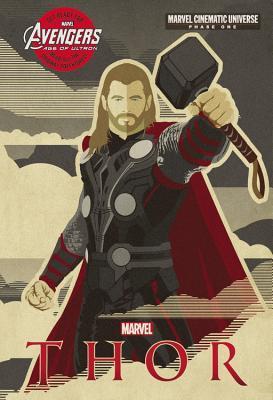
My Hilarious Yet Wrathful Overview Of Phase One: Thor, Redux
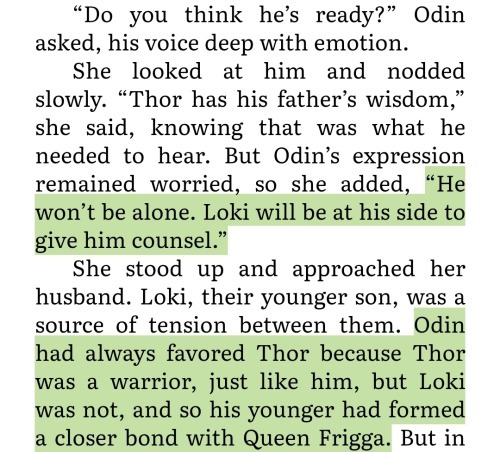
—

If your son who’s to become king requires a babysitter to not screw it all up and also the idea of him being king is stressful enough to put you into a coma, maybe, uh… reconsider doing that? Just a thought.
But you see here why Odin was so deadset on Thor becoming king, despite him being ill-suited for the role. It’s not about what’s best for Asgard; it’s about personal legacy. Thor is Odin’s mini me, and Loki is very much not. There are places within the text where Odin laments Thor “lacking his father’s wisdom” (he’s definitely inherited your humility, though, Odin!), but he hopes for Thor to grow into a “wise king” like himself. Whereas he holds no such illusions (lol, pun) that Loki will ever take after him.
now with tag commentary! #this scene is in the script and both novelizations #(though in reading this novel seems to just be a more complete version of the junior novel? #idk i'm confused because they're supposedly written by different authors but so far the text is identical) #and it drives me insane each time i read it


“Haha, I’m a warmongering piece of shit, isn’t it funny?”
I know, I know. I try to cut Asgard some slack for being such a militaristic culture because social changes happen slowly and when you live for thousands of years per generation, it makes sense that your views on things like war would be regressive. The text says Odin has ruled Asgard for tens of thousands of years (so much for taking Loki’s “give or take 5,000 years” line literally; sure, the Odinsleep would have extended Odin’s lifespan, but by that much? Idk).
Still, fuck Odin. Especially since he’ll eventually try to shame Loki for doing the same thing he’s fucking boasting about here. And on a much smaller scale too.

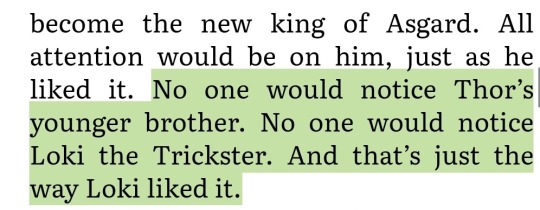
…is it, though?
I actually think Loki’s relationship with being the centre of attention is really interesting in its complexity and we don’t discuss it enough. I’ve said this before, but he strikes me as the sort of person who craves attention but also wouldn’t really know what to do with it if he had it. He craves it as a result of neglect, because he’s never been shown recognition or validation. This is why he seems to revel in it in Stuttgart, even in (or maybe especially in?) his brainwashed state. But he also frequently comes across as pretty introverted and has horrible self-esteem, so I think on another level, sustained, genuine attention would make him feel kind of uncomfortable. Loki seems to believe that in order to be loved or respected, he has to literally be Thor, though. And Thor has always been the centre of attention, so for Loki, attention is synonymous with respect.
I find Loki’s relationship with wanting attention especially fascinating because I too both crave and fear it. As a borderline, I need it. When no one is paying attention to me, I lose my sense of identity. I feel as though I literally cease to exist. It’s excruciatingly painful. And yet, I have no authentic sense of self; I’m just a chameleon, and the closer people get to me, the more likely it is they’ll see behind my mask. They’ll realise it’s all a show and that I’m actually no one. And then they’ll leave. I can’t help wondering if that’s how Loki feels sometimes too.

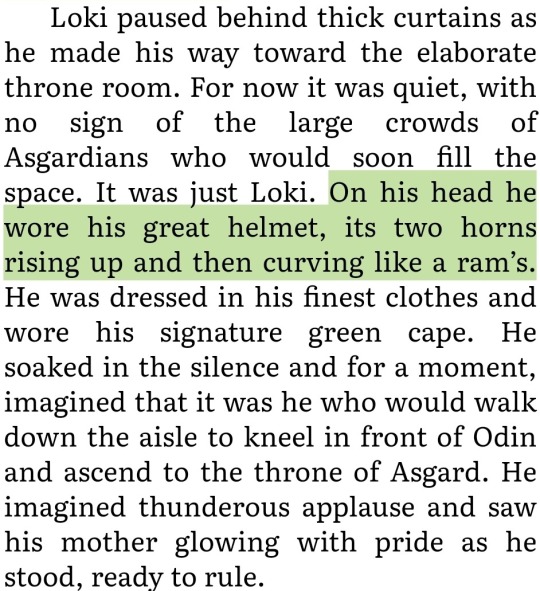
Wait, what? You mean goat. His horns are shaped like a goat’s. This is a ram:
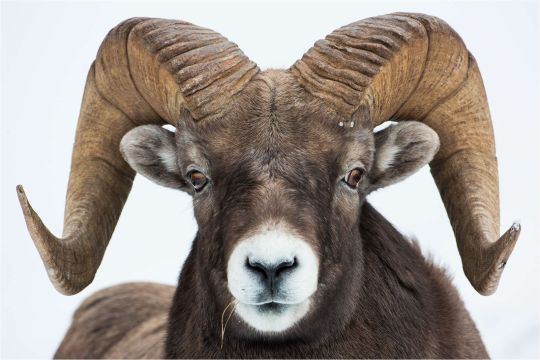
This is a goat:
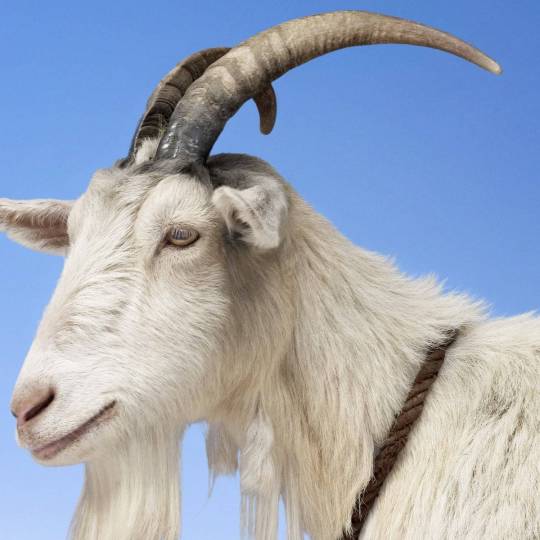
This is Loki:
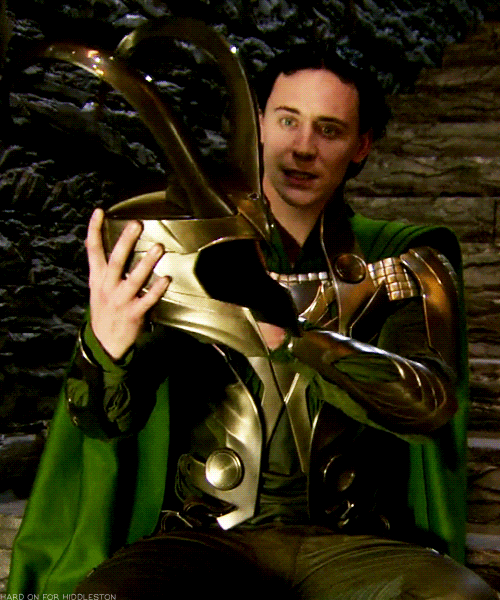
Do you see now? They’re like a goat. Not a ram. Not a cow. A GOAT.

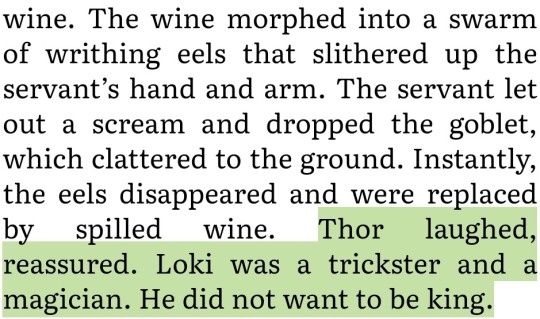
This book was written before Ragnarok was a thing, so it may be unfair to connect the two, but it still seems worth noting that it was Thor who reduced Loki to being no more than a trickster to begin with. “You could be more,” my ass. Loki’s problem has never been that he was one-dimensional; it was always that the people in his life, including Thor, refused to see any other dimensions to him. Which makes those words particularly cruel—as if they aren’t cruel enough already, what with the physical torture and all.

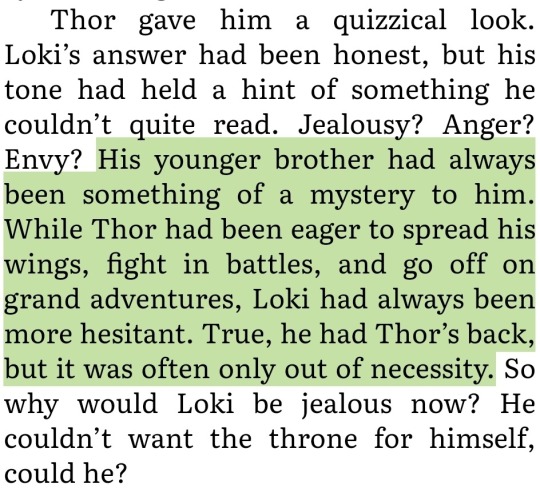
Always happy to have cause to point out that
Loki was on Thor clean-up duty their whole lives; he certainly was not trying to kill Thor.
People like to point to Loki’s attempted genocide of the Jötnar and attempted(-ish? lol) conquest of Earth as proof that he’s some kind of violent maniac. But in a little place I like to call reality, Loki was historically far less aggressive and bloodthirsty than his peers.

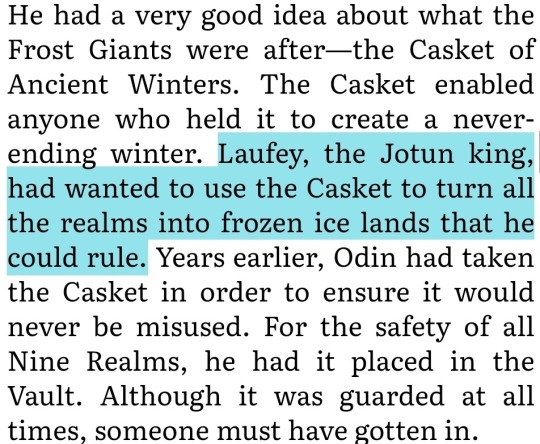
Question: why is one conqueror evil and the other is righteously entitled to ruling over the Nine Realms?
Asgardian exceptionalism FTW

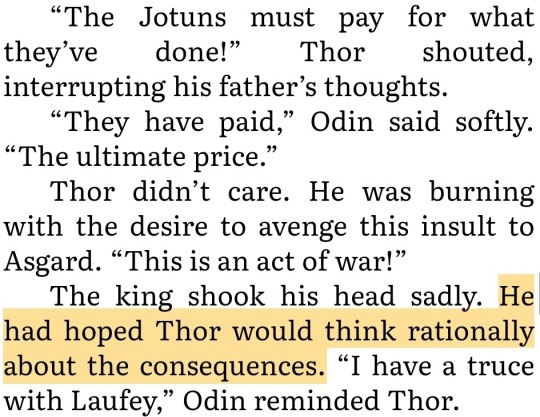
I can’t even begin to imagine what would lead you to expect such a thing, Odin. 😂
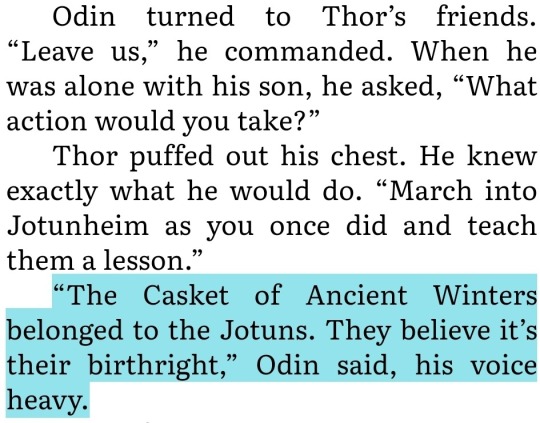
Uh, ‘cause it is?? And also their planet is MELTING without it??
This is all only within the first two chapters, btw. Lmao

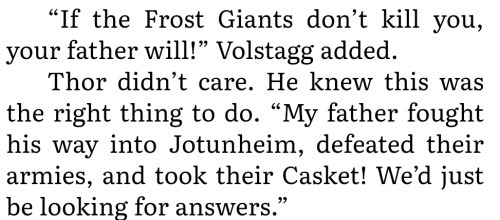
—
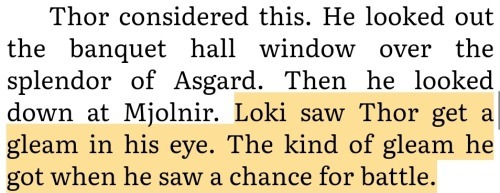
—
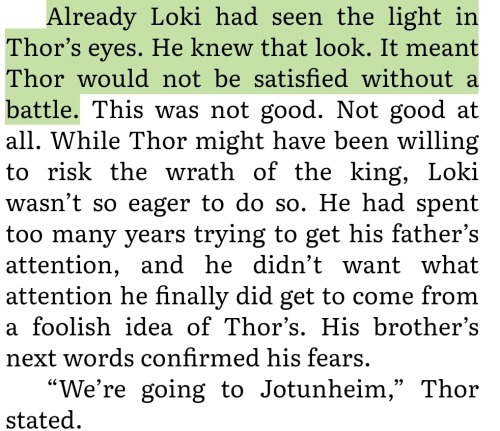
—
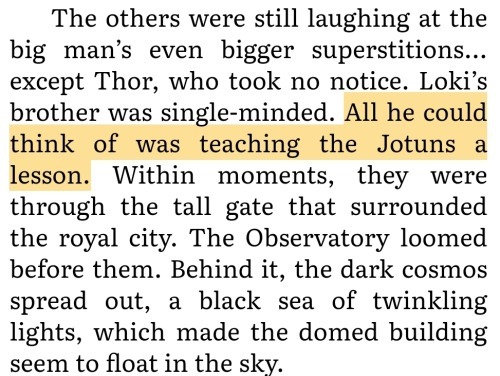
“Looking for answers,” my foot.

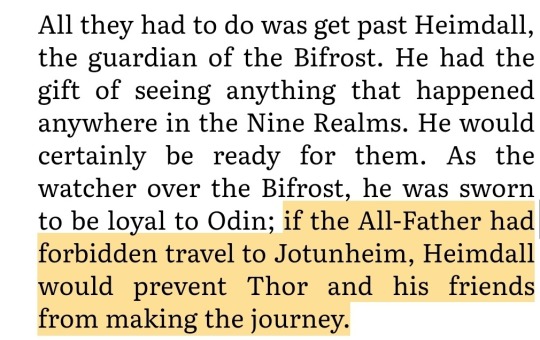
YOU WOULD THINK SO, WOULDN’T YOU??
#i mean unless you knew heimdall #he only commits treason on days that end in y

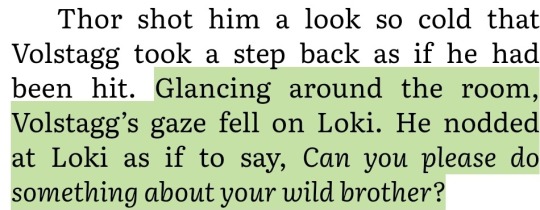
—
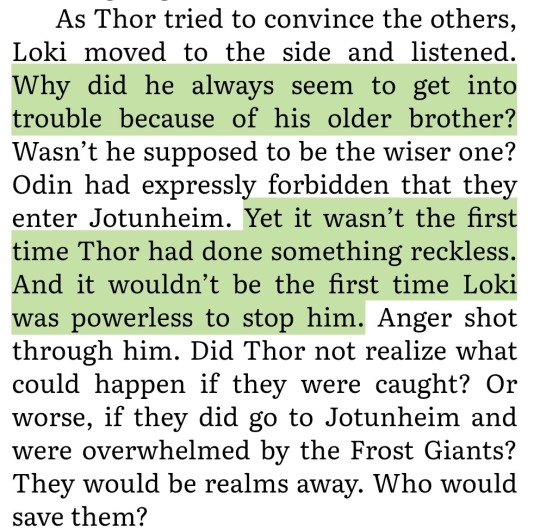
—
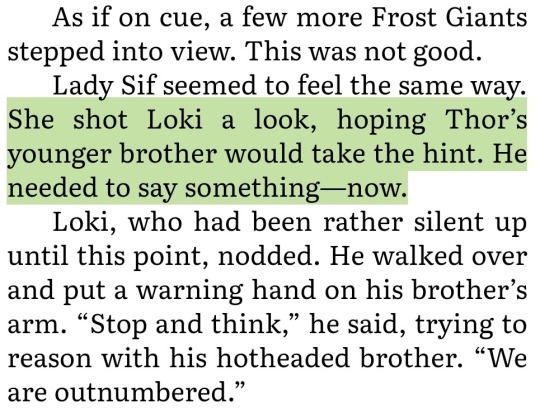
What’d I say? Thor clean-up dutyyyyy

Just wanna remind everyone that this
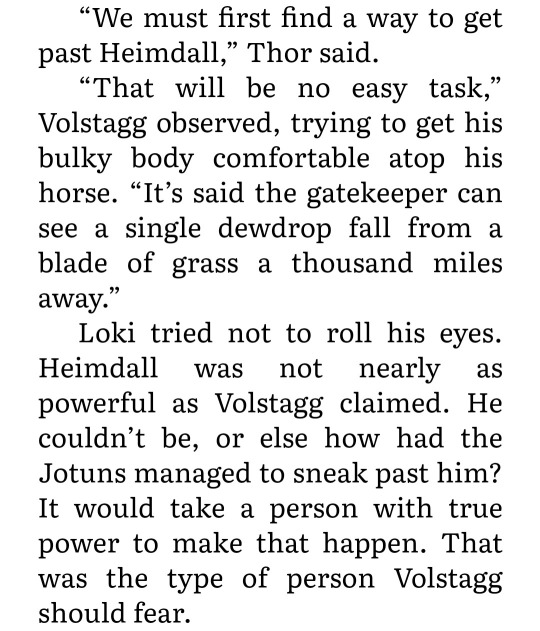
is why he’s smiling during this scene
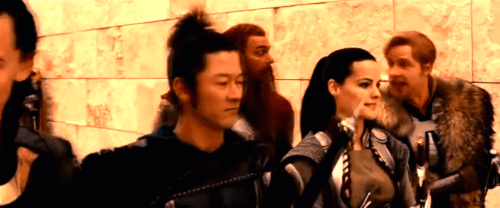
because it makes me laugh every time. 😂

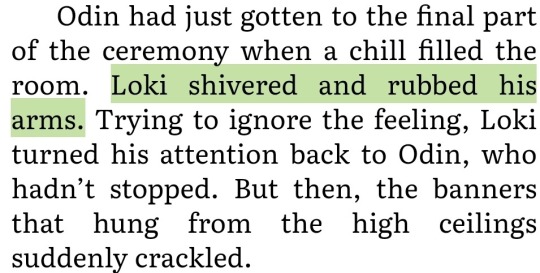
—
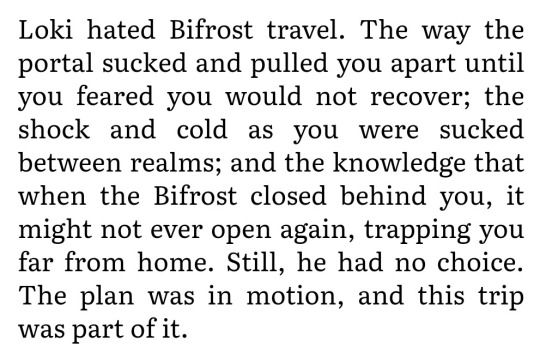
My heart breaks every time I remember that second excerpt because literally ALL OF IT happened to him when he survived falling through the wormhole. My poor boy. 😭
But also of note… Loki gets cold (and also does not like being cold). This interests me because 1) as many are aware, the prevalent headcanon that Loki has a low body temperature irritates me and 2) it possibly(?) lends weight to the theory that he may not be fully Jötun, whether by virtue of his birth or Odin’s spell.

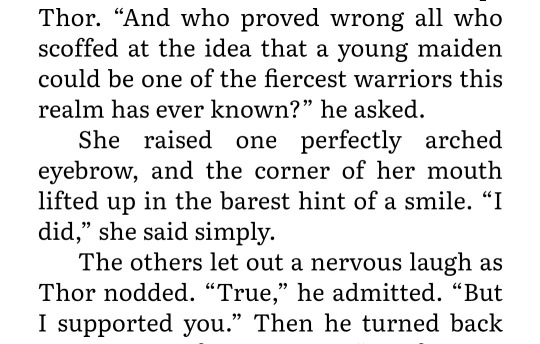
Haha, look at this Feminist Icon™ trying to take credit for his female friend’s accomplishments! Truly inspiring.
#for some reason the ragnarok lovers have somehow decided that thor is both a feminist and lesbian icon #whatever that means 🤷♀️ #and i'm still trying very hard to figure out why #is it literally just because he *says* he respects women or whatever in that dumb rambly conversation with valkyrie?

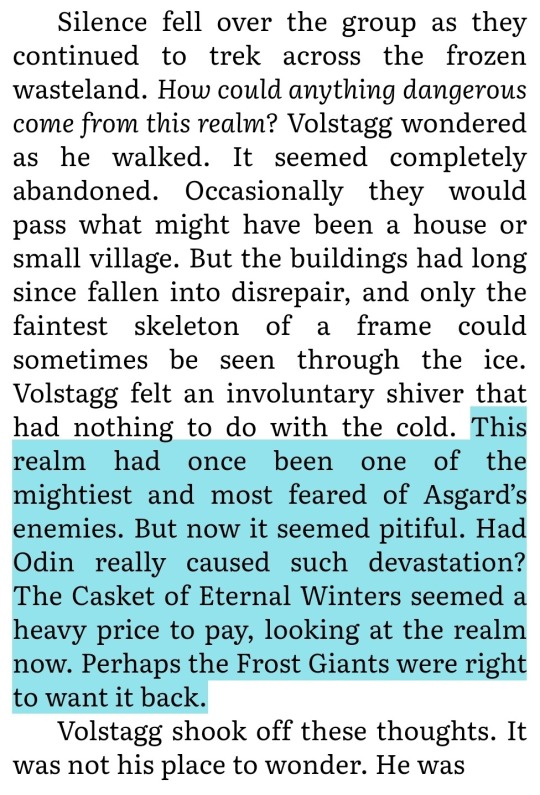
Ooh… you were so close to getting the point, Volstagg. So close. Take your tongue off Odin’s boot for just a couple minutes longer.
Also, the author just forgot the name of the Casket. How did this book get published? 😂

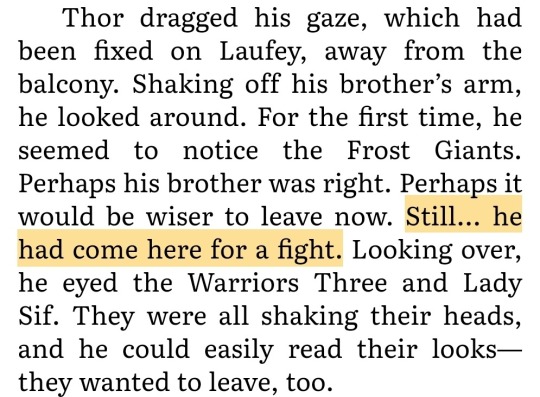
JUST LOOKING FOR ANSWERS, HUH?

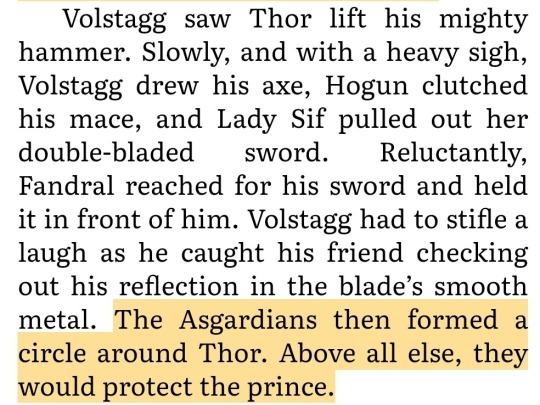
Because fuck Loki, amirite? He, uh… he’s a prince too, you know.
Also… Fandral, you dweeb 😂

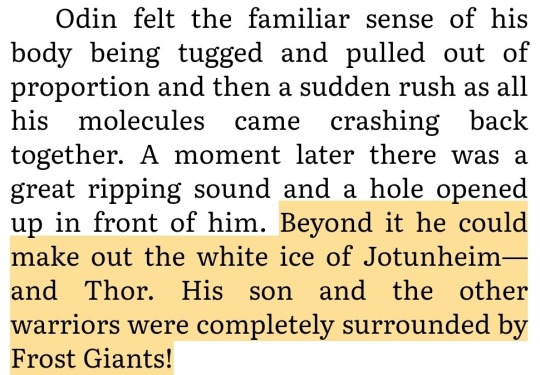
…am I reading too much into this, or did Odin just literally forget that Loki exists?
On the other hand, the author also seemed to forget Loki existed for most of this chapter, so who knows. 🤷♀️

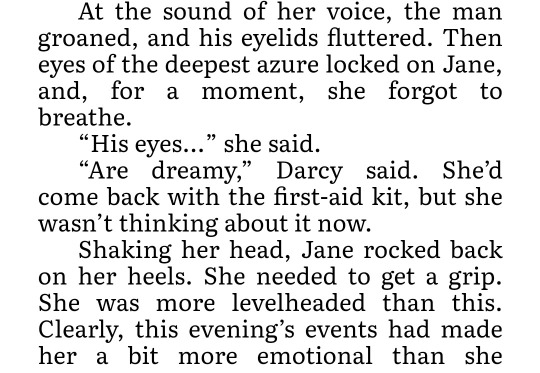

lmao @ Jane immediately trying to convince herself she’s too rational to be attracted to a stranger

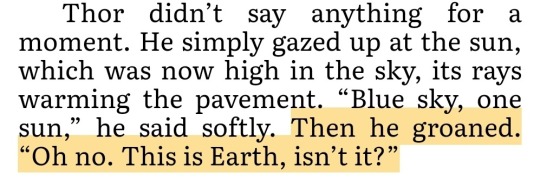
Honestly, though, big mood.

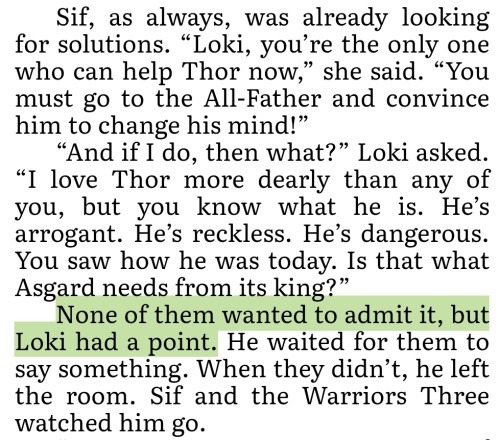
Just your periodic reminder that Thor’s sycophantic friends KNEW Loki was right and decided to throw him under the bus anyway.

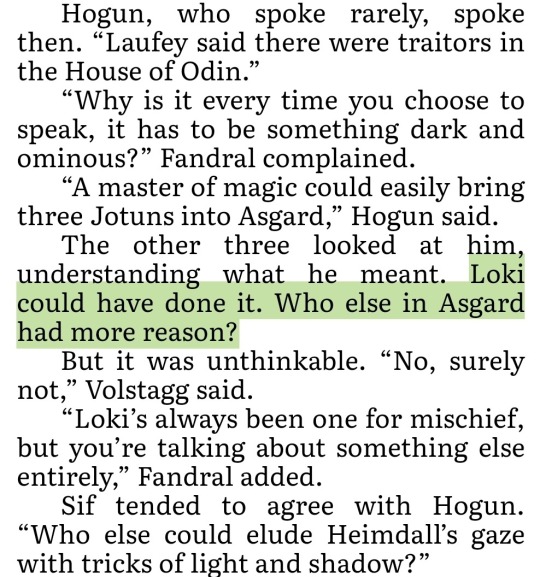
Just as I’ve always said: That was it. That was their ENTIRE rationale. That Loki *could* have done it, therefore he must have. Please tell me these people have nothing to do with Asgard’s justice system.
…lol, jk, Asgard has no justice system.
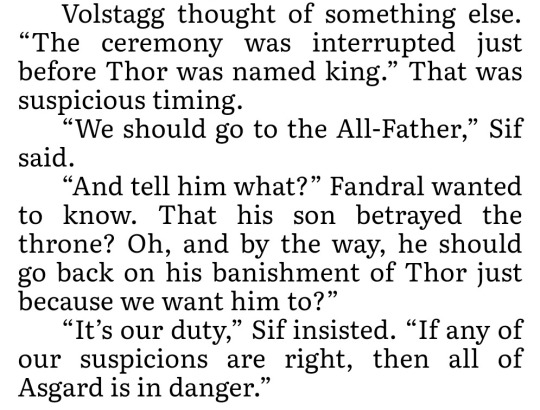
Ok, first of all, no.
Second: thank you, Fandral. You’re a self-absorbed cad, but also evidently Thor’s least stupid friend.
Thirdly, how…? First, it was, “Loki arranged all this because he’s jealous of Thor.” Now they’ve suddenly jumped all the way to, “All of Asgard is in danger.” What exactly does Sif think Loki is planning? He’s gonna, what… assassinate Odin and then sell Asgard to the Jötnar?

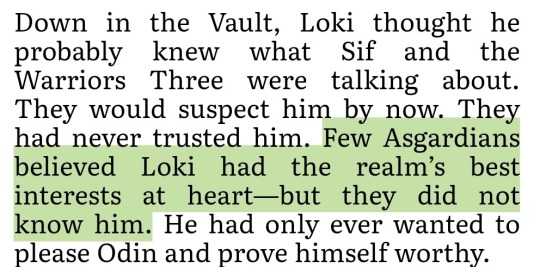
—
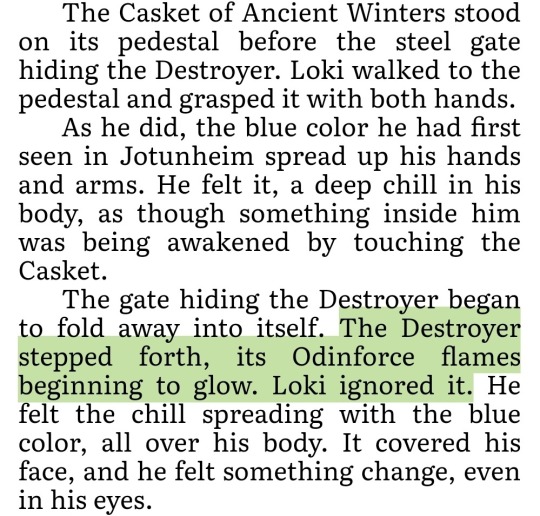
Please stop hurting me.
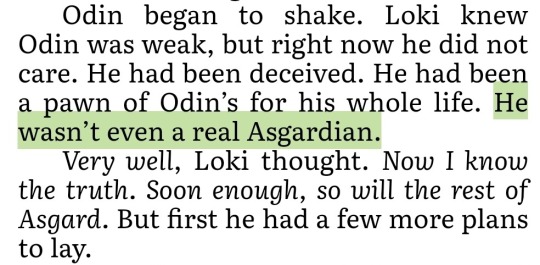
Just so there’s no confusion: this one sentence explains everything Loki did for the rest of the movie. It explains how a person who has been historically non-aggressive suddenly transforms into a warmonger. To prove himself a real Asgardian, like his brother and father and grandfather.


—
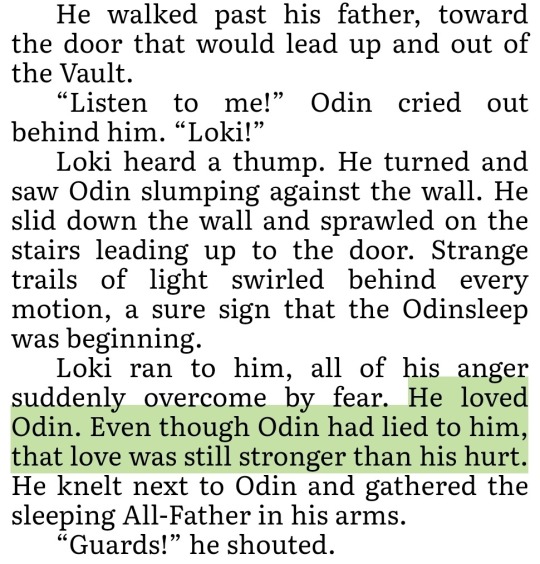
…why did Odin fall into the Odinsleep in two completely different scenes in this book? I’m super confused.
Also, we really need to talk about how cruel it is of Marvel to keep forcing Loki to prove his loyalty again and again and again when he’s been doing so almost literally since we met him. And by “we need to talk about it”, I mean I need to tie Kevin Feige and co. to a chair and spend a minimum of five hours lecturing them on how poorly they understand their own fucking character.


Let’s just be clear here: they’re talking about Loki. They’re saying Loki, their LEGITIMATE king, is an enemy of Asgard, based on evidence so paper-thin it’s practically invisible. Just… please, let that sink in. Take a moment to appreciate how utterly fucked up that is.

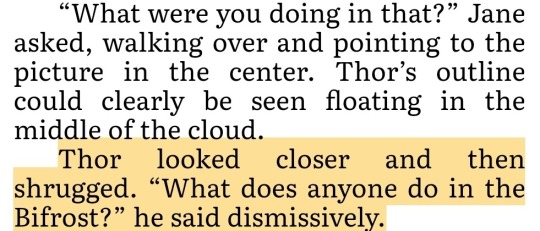
I’m sorry (not really), but Thor was so much funnier before Ragnarok.
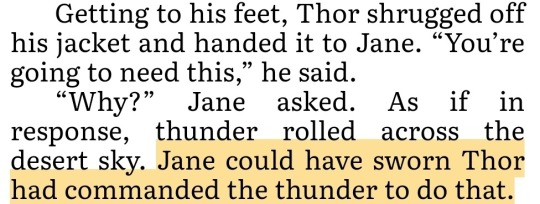
This scene has always kind of bugged me. If Odin removed Thor’s powers, how come he can still control the weather? Confusing.

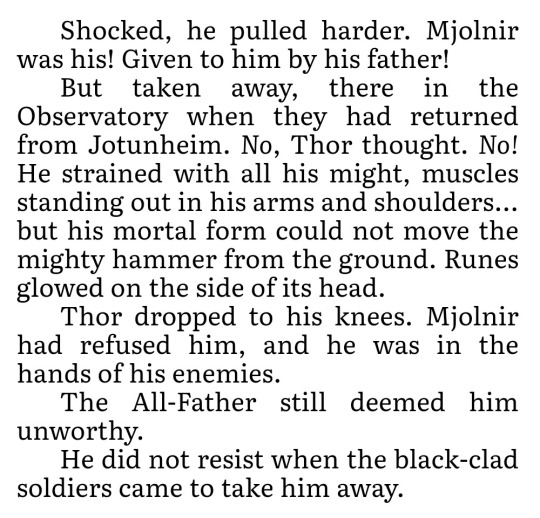
So what exactly was Thor’s plan anyway, before he realised he couldn’t lift Mjölnir? He was just gonna call on Heimdall to help him commit treason AGAIN, show up on Asgard against the expressed command of his king, and… Odin would just shrug and be like, “You got me, son! I guess I can’t keep you down. Welcome home!”?
…I mean, I guess that more or less is what happened in the end, but it’s hard to imagine it would have still gone down that way without all the stuff that happened with Loki. Idk.
#look what i'm saying is... thor is not exactly a thinking person #no one on asgard is a thinking person #except loki but he's crazy now so he's also thinking somewhat poorly lol

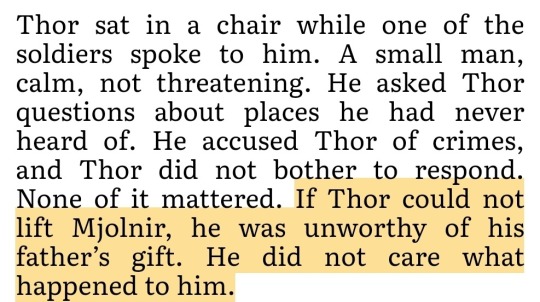
Cool, Thor. Now imagine feeling that way for ONE THOUSAND YEARS and develop a little fucking empathy for your brother.
But you won’t.
You’ll brush off his feelings of worthlessness as “imagined slights”. 😒

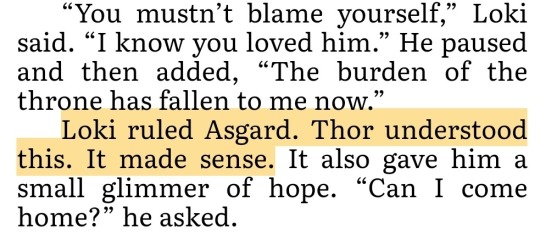
Nice that somebody knows how the royal line of succession works, I guess…

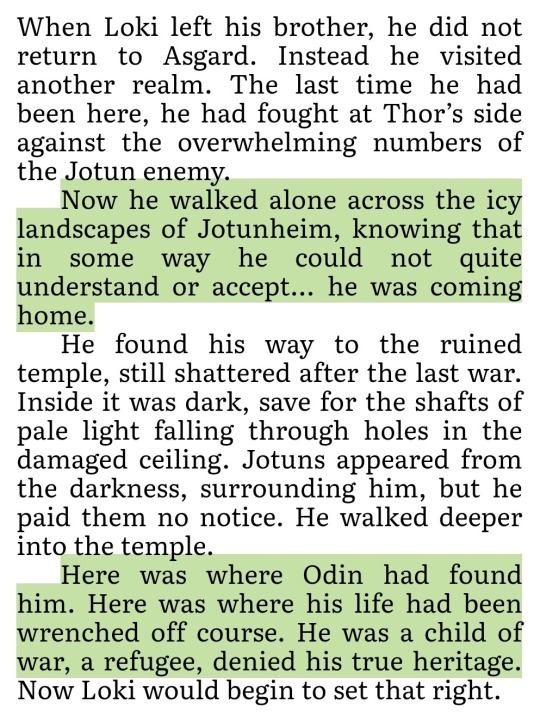
That sound you hear? Yeah, that’s just my heart breaking. NBD.


First, they mislabelled it the Casket of Eternal Winters. Now it’s the Cask of Ancient Winters. Author must have been thirsty when they wrote this. Lol

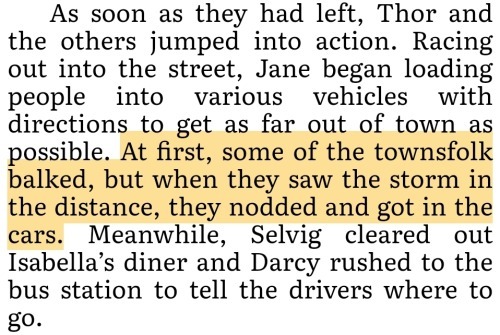
Look, not to nitpick, but this is not the recommended procedure when you see a storm that you don’t believe is of supernatural origin coming. I’m just saying. Lol

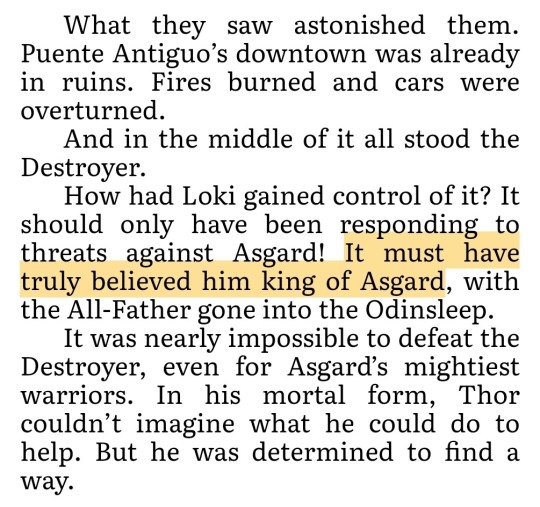
Uh… ‘cause he is?? And your pals are committing treason AGAIN, Thor, so it technically is responding to a threat to Asgard. Just FYI.
Anyways, this is an important point that doesn’t get made often enough. People want to act like Loki illegally usurped the throne somehow, but even without the deleted scene that explicitly shows Frigga passing rulership to him (a scene which is, for some reason, entirely skipped over in this book, but whatever), understand this: Loki could not have controlled the Destroyer unless he was legitimately King of Asgard. The fact that he’s able to do so is irrefutable proof that his rulership is valid.

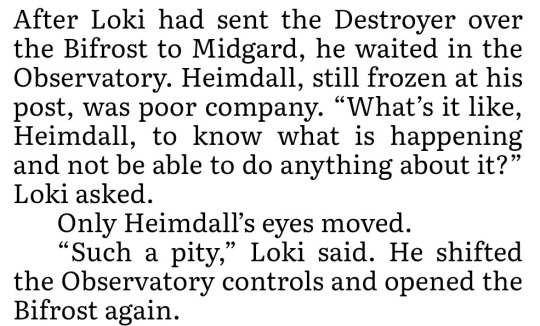
lmao you little shit

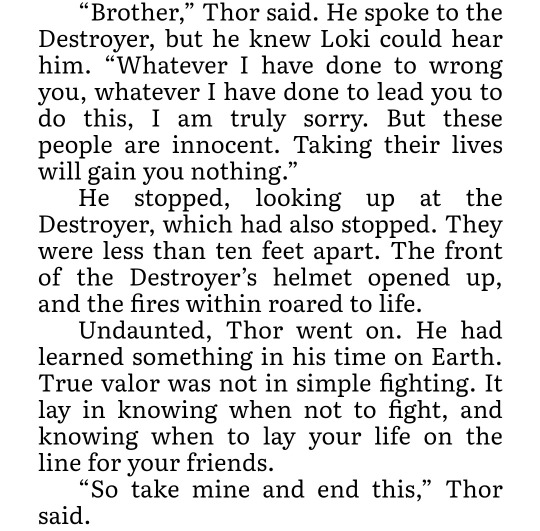
So… here’s my issue with this scene (and with Thor as a character): He always assumes that Loki’s acting out specifically to hurt him. That Loki’s entire life and thought process revolves around Thor. He does it in this scene, he does it in The Avengers… it’s just a chronic thing with Thor. Everything is viewed through the lens of Loki inexplicably hating him.
But that’s… just not accurate. Yes, Loki harbours a lot of jealousy towards Thor. But that’s not what’s happening in this scene. Loki is not trying to kill Thor here because he wants him dead; he’s doing it because Thor (and his friends) are getting in the way of Loki completing his ultimate goal. Loki tried to solve this problem non-violently, by lying about Odin being dead. It’s Thor’s friends who all but forced his hand by going behind his back and trying to bring Thor back to Asgard against Loki’s (and Odin’s!) direct orders.
For all the humility he’s learned in the past few days, this entire speech is still really all about Thor. About assuming that Loki’s doing this for personal reasons, because he holds a grudge against Thor for some unknown reason. This is implicit in his request to “take [my life] and end this.” It never even occurs to him that his friends are traitors to the Crown and Loki, as King of Asgard, is perhaps justified in pursuing them.
It also needs to be acknowledged that Thor’s apology here is hollow, even if it’s ultimately coming from his heart, because he has no idea what he’s apologising for. “Whatever I have done to wrong you” is not an apology. An apology addresses specific hurtful actions taken and commits to not repeating those mistakes in the future. Thor cannot commit to not repeating the hurtful things he’s done, because he doesn’t know what he’s done. Despite his best intentions, what Thor is doing here is actually kind of manipulative. He’s not addressing any substantive issue between the two of them; he’s just trying to talk Loki down. And it ultimately fails not because Loki doesn’t care or because he wants Thor dead, but because it doesn’t actually change anything.
Finally and only semi-relatedly, we should maybe at some point talk about the fact that Loki, who is stated to be a master tactician, has displayed a weird pattern of hardly ever being as lethal as he could be. He freezes Heimdall in place instead of killing him outright; he backhands Thor with the Destroyer instead of incinerating him; he, well… *gestures vaguely at almost the entirety of the first Avengers movie* Anytime the violence is even a little bit personal, he seems to hedge. Odd behaviour for somebody who’s supposedly super evil.


I’m sorry, I know I’ve pointed it out at least a hundred times before, but I just can’t encounter this scene in any form without taking a moment to appreciate how underrated and hilarious it is.
I also genuinely wonder how many Ragnarok stans who have accused me of having no sense of humour, have failed to laugh at moments like this one. Kinda feel like if you need to have the comedy spoonfed to you in the form of ass jokes, maybe you’re the one whose sense of humour is lacking. 🤷♀️

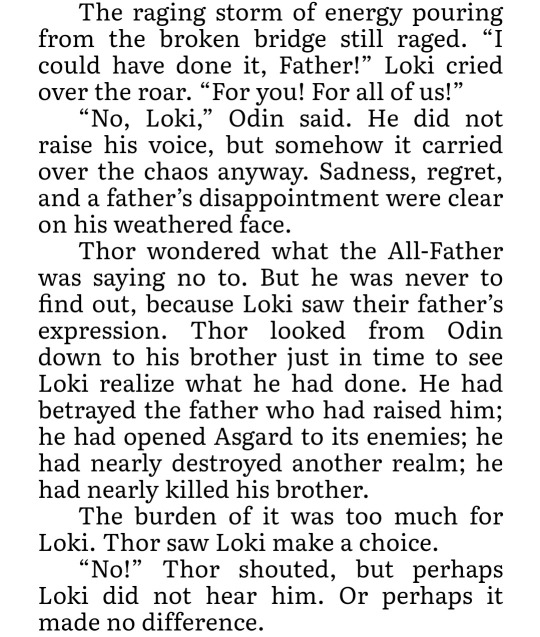
Let’s be super clear: this is not what happened. Loki did not betray Odin; he was betrayed by Odin. He did not open Asgard to its enemies; he attempted, misguidedly, to destroy Asgard’s enemies. And he most certainly did not commit suicide out of a sense of guilt.
I’m not saying Loki did nothing wrong, nor am I saying he feels no regret for the lives he has taken. What I’m saying is there’s no indication that he believes he betrayed Odin or Asgard in the process. Which makes perfect sense, because he didn’t. Everything he tried to do was for Odin and Asgard. It was misguided and horrible, yes, but it can hardly be classified as a betrayal.
The insurmountable burden on Loki is not that he did terrible things, but that no matter what he does or how hard he tries, Odin will never look at him with anything but contempt. Consider once more these passages from the very beginning of the book, at Thor’s coronation:
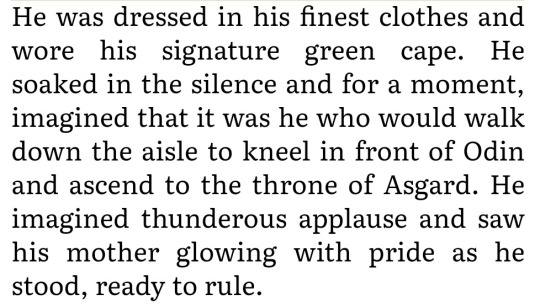
—
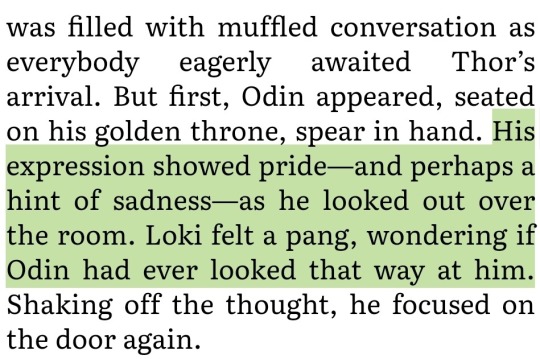
Consider that this book goes to great pains to point out that Odin favours Thor because Thor is a warrior like him. And yet even when Loki embraces that, even when he acts more war-like than ever before, Odin rejects him— just as he always has.
There is a reason why this moment is the last time Loki will ever call Odin his father. Because he realises once and for all that, no, nothing he tries will ever be good enough; no, Odin won’t ever look at him with pride. That is Loki’s burden. That is why he lets go.

The epilogue is really just two pages of making me want to vomit.
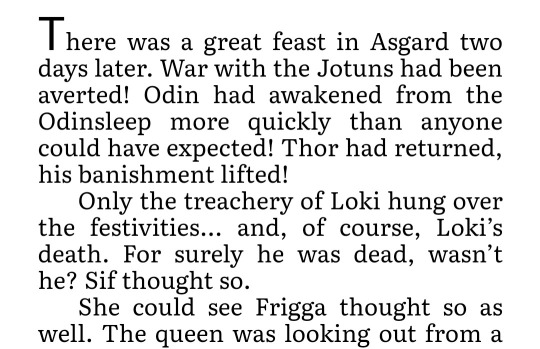
There’s your party where Thor and a certain subset of the fandom insist that Loki was mourned. There’s barely an indication here that anyone even perceives his demise as a negative thing.
“[Sif] could see Frigga thought [Loki was dead] as well” also contradicts the tie-in comic for TDW, so I don’t know what the author is on about there. Unlike the majority of Marvel comics, the tie-in comics are canon to the MCU, so it’s a bizarre statement to make.

COULD YOU SMEAR THE DEAD* ABUSE VICTIM A LITTLE HARDER, PLEASE? Fucking hell.
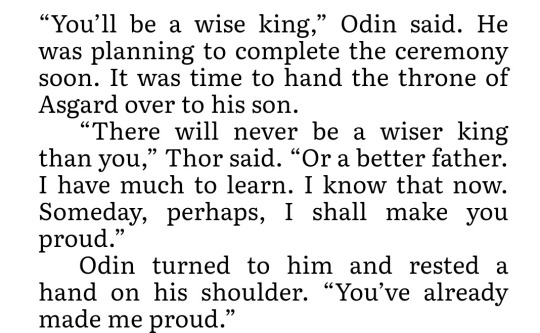
No matter how many times I encounter this scene, in whatever format, I still fail to become desensitized to how disgusting it is. I realise there’s a good chance that whatever version of events Thor has been told was twisted at best; but how you can look at a man whose son has just committed suicide under any circumstances and say there will never be a better father than that guy, is utterly beyond my capacity to understand.
And Odin’s “you’ve already made me proud” line just feels like extra salt in the wound because, again, Loki let go because he realized Odin would never say those words to him. And yet they come so damn easily when it’s Thor.
Fuck this entire family so much. I think I hate them more than Loki does. Sometimes I wonder what he would think about that. How he would react to knowing that not only is he actually loved, but that he’s so loved that people are genuinely furious at the way he’s been mistreated. That there are people who regularly devolve into full-on rants because they just can’t contain how much anger they have towards the people who hurt him. I think he’d have a hard time wrapping his head around that concept, tbh.
Anyways, to end on a not-completely-depressing note, I’m still waiting for someone at Marvel to explain how Loki knew what Thor said in this scene after plummeting into a wormhole. ‘Cause he references this conversation as Fauxdin at the end of TDW. So like… ?? Did he steal Odin’s memories before he erased them? Because that would be… kind of neat, actually. And very clever. Not entirely ethical, of course, but it’s Odin, so fuck ethics.
WELP, THAT’S IT. Thanks for following along with my dumbassery, hope you enjoyed yourselves. Lol
#phase one: thor#loki meta#thor meta#odin's a+ parenting#frigga's b+ parenting#topic: thor and loki's broken relationship#loki#thor#heimdall#lady sif#the warriors 3#jane foster#ragnarok cinematic universe#mcu#topic: asgardian hypocrisy#topic: asgardian militarism#topic: odin's family dynamic
129 notes
·
View notes
Text
Patricia Highsmith: The problem of good art made by bad people

No writer would ever betray his secret life. It would be like standing naked in public.
- Patricia Highsmith, the novelist writing to a friend in 1940
Patricia Highsmith, who died in 1995 having written a series of psychological thrillers, including The Talented Mr Ripley and Strangers on a Train and the romance The Price of Salt, left two sets of diaries hidden in a linen closet in her home in Ticino, Switzerland.
In one she recorded details about her professional life: plot ideas, philosophical musings and thoughts on writing. In the other she documented her private reflections and memories, including a single sexual encounter with the writer Arthur Koestler (a “miserable, joyless episode”) and her efforts, through psychotherapy, to “get myself into a condition to be married”.
She had no more compassion for men than she did for women. In one entry Highsmith writes that “the American male does not know what to do with a girl once he has her. He is not really depressed or inhibited by his inherited or environmentally conceived Puritan restraints: he simply has no goal within the sexual situation”.

Highsmith’s diaries, which run to more than 8,000 pages, have been pored over by biographers, but have never before been made public, or in this case interwoven into a single narrative of the life of a complex woman who thought deeply about themes of good and evil, loneliness and intimacy.
It was in her diary that she described becoming sexually obsessed with a customer at Bloomingdale’s in New York, whom she later followed to her home, provoking observations about murder and love.
She had an obsession about detailing absolutely everything in her life, very much like Sylvia Plath. And she drew on the diaries for her novels, which explore the notion of obsession, guilt and murder, and reject rationality and logic for the darker elements of human personality.” Dubbed “the poet of apprehension“ by the novelist Graham Greene, who said she “created a world without moral endings … Nothing is certain when we have crossed this frontier”, the Texas-born Highsmith was deeply influenced by European existentialists such as Albert Camus and Søren Kierkegaard, and those influences are deeply felt in her diaries.
She was a lesbian who hated women, totally politically incorrect in lots of ways, and certainly not a poster girl for the feminist movement. She hated blacks, Jews, men, and women. A sort of equal opportunities hater then. In mitigation Highsmith was self aware of her own beliefs and it mortified her and was a source of constant anxiety. She herself was fighting many demons including her mother’s rejection, an attempted seduction by her father as a child, and being sexually abused by two travelling salesmen. She had a tough life.
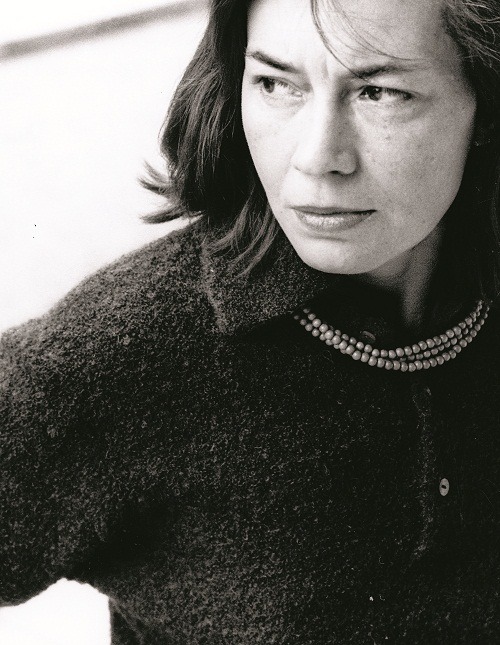
But there is a question over how far Highsmith can now be assimilated into contemporary culture of ‘wokeness’ and ‘MeToo’.
There is no question in person she could be a monstrous, violent and quite unpleasant woman. Knowing about her life and views could for some make it difficult to read her works. But for all that I think the diaries’ publication could help to again reveal that, contrary to popular imagination, creativity is not necessarily rooted in our best instincts.
These same highly culturally charged debates raged around the controversial French writer Celine in France. In Germany Wagner continues to be a touchy issue. Or back again in France, the recent controversy at the Césars where many people walked out as child minor rapist Roman Polanski was honoured for his latest film.
Going further back Gaugin was a pedophile. Degas was an anti-Semite. Caravaggio killed a man. Where do you draw the line? When do you draw the line?
Some argue art cannot be good or evil. Only the artist can. What he/she presents as art is a different dimension of thinking and somehow not really representative of the artist. I’m not entirely convinced by that argument. If only because great art is never transmitted through an empty vessel but is actively germinated through the life experiences of the artist. But also more importantly most artists don’t separate themselves from their art as they are convinced their art comes from the deepest depths of their being.
We don’t have to be puritans to acknowledge that some henious actions deserve more consideration than historically allotted to a consideration of the artist and his/her works.
But those who are ‘woke’ liberal left activists arguably seem to be advocating a one size that fits all approach. There is no wriggle room for discourse correction or allowing nuance to inform the conversation. And I use the word ‘conversation’ deliberately because such things are nearly always being worked out in real time and also each one of us ascribe different values to different things e.g. Picasso cheats on his lovers and so I don’t like his art, whilst others would say, so what? Grow up. There is a serious slippery slope that if you eliminate the bad artist and writer from the canon and you might as well eliminate art and literature itself. And that’s where we might well end up.
I believe that adjusting personal behaviour seems much easier than enforcing an interpretative cultural lens on a shifting audience and telling them this is how you should enjoy art.
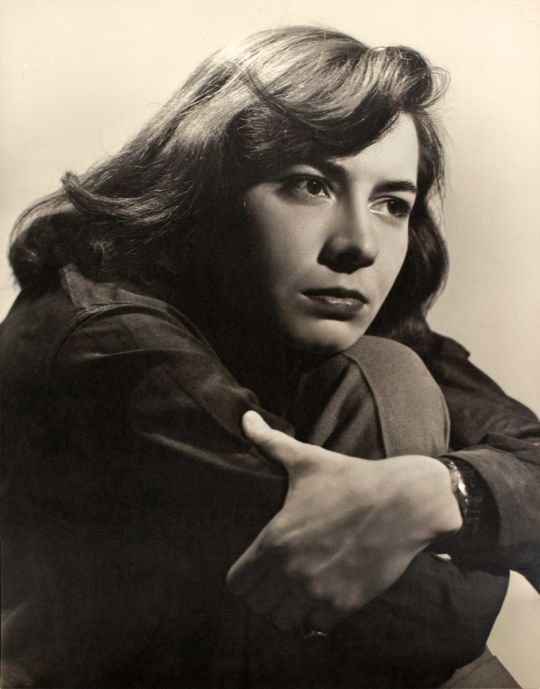
I personally believe it’s a matter of personal conscience and conviction. If you’ve really searched your heart, and found that a piece of art is just that important to you, as many people do without admitting it out loud, then it should be fine to engage with it. But the imperative now is to privately think about why it matters to you. If I can justify that to myself then yes, I will go ahead and ‘enjoy’ that piece of art regardless of how much of a shit the artist was or is.
To me it’s not a question of compartmentalising, of ignoring or suspending my disgust with an artist's personal behaviour so as to concentrate on the art. I'm watching and reading because I expect art to be about moral dangers in a way that is less didactic than essays are. I expect art to be troubling because I expect people to be troubling. I am prepared to like and dislike something in every work. I can also appreciate the aesthetic genius of a moral monster without feeling that I am becoming inured to monstrosity.
For this reason when I for example look at Benvenuto Cellini, creator of Perseus With the Head of Medusa, was a murderer and a rapist. He killed at least two men and was accused by a model of sexually assaulting her. This does not stop me from looking with great amazement and curiosity at the naked and sexual Perseus With the Head of the Medusa. The knowledge of the immorality of the creator does not distract from my enjoyment of his creation; indeed I am made even more curious to know how beauty is perceived by a violently troubled man.
In the end for me, and I can only speak for myself, contrary to popular imagination, creativity is not necessarily rooted in our best instincts. Nietzsche said, “One must still have chaos in oneself to be able to give birth to a dancing star.” I like that.
A human creature born abnormally, inhumanly sensitive. To the artist, to paraphrase Pearl S. Buck, a touch is a blow, a sound is a noise, a misfortune is a tragedy, a joy is an ecstasy, a friend is a lover, a lover is a god, and failure is death. Add to this a cruel overpowering necessity to create - so that without the creating of music or poetry or books or buildings or something of meaning, his very breath is cut off from him. He must create, must pour out creation. By some strange, unknown, inward urgency he is not really alive unless he is creating.

In Patricia Highsmith’s case it’s revealing she said once in a sly backhanded way, “My New Year’s Eve Toast: to all the devils, lusts, passions, greeds, envies, loves, hates, strange desires, enemies ghostly and real, the army of memories, with which I do battle — may they never give me peace.” A true great artist never know really knows peace or contentment for this is the price of creation. The intensity of personal turmoil is the fuel of their creativity.
The Greeks may have believed that they had “muses” whispering ideas in their ears. Or that the Romans believed they wrote with their “genius”. But I suspect the best artists are those that are in touch with and confront their humanity, at their best and at their worst.
67 notes
·
View notes
Text
SS Tily does not lay claim to Lover; a thesis
I thought this would take me longer but y’all, I’m done with Part 2 of my Gaylor analyses. Unfortunately this chapter brings bad news for Tily nation. I honestly don’t think many of the songs on Lover are about that relationship. But I also think it’s not as simple as the mainstream Kaylor narrative would have us believe. Let’s dive into this, shall we?
First things first. I think it’s worth noting that many of the songs on this album are not about romantic relationships at all. Like it’s a bit of a marketing ploy to portray it as an album primarily about romantic love when so many songs explicitly aren’t about that feeling. In fact, there are more themes on Lover than on any of her earlier stuff - it’s something she expands on in folklore.
I Forgot That You Existed, The Man, The Archer (which I firmly believe is about her debating coming out), Miss Americana & the Heartbreak Prince (very obviously about the political situation generally and supported by the doccie title), London Boy, Soon You’ll Get Better, YNTCD, and ME! are all about explicitly different themes. Obviously there are a couple references within those (like ME! has that line about “I never leave well enough alone” which reappears on the 1, and The Archer mentions someone “staying” but I still think ME! is about self-love not romantic love and The Archer is about personal anxiety around identity). Fundamentally, they are not love songs.
I don’t think that’s really up for debate. The only one I can see anyone - say Toes or like hardcore Tily fans - debating is London Boy. Unfortunately for my Tily babes, I do think it’s satire that serves as a homage to Joe and the other British beards, and possibly riffs a teeny bit on her time with Lily. Contrary to some gold medalists in Kaylor mental gymnastics, I fully believe Tay does make reference to Joe in her lyrics (I’ve mentioned the fictional verse for Dress and the reference to “keeping him” in Ready for It). This really doesn’t have any of the hallmarks of Tily songs off of Rep. The British references in CIWYW, KOMH and Delicate are subtle and chilled and actually quite cute. London Boy is an onslaught of non-sequiturs about London, the UK and her beards. Also “stories from uni” fits both Joe and Tom H, but it doesn’t fit Lily who never went to university. All her Lily songs are about hiding out in private; London Boy is all about galavanting around town with “his” friends (Lily and Tay had the same friends though?) It’s simply not about the same person or the same relationship.
I do think there’s a chance it could be poking fun (lightly) at Lily/that period she spent in London because as I’ve already said I think Tay is not above shading ex-girlfriends and it seems like the kind of thing Karlie would’ve also found a bit funny. I think when she got back together with Karlie - which almost definitely happened - she would’ve 100% laughed about the “say you fancy me not fancy stuff” era. That would explain the recurrence of both Motown and queen imagery, which first appeared on KOMH. But where KOMH felt very genuine and authentic, this one is obviously meant to be funny.
Right. So. Now that we’ve established 8 songs are about other themes, let’s get the Kaylor songs sorted: Cruel Summer, Cornelia Street, DBATC, False God and Daylight are all undeniably about Karlie fucking Kloss. They all feature the images and tropes and hallmarks that pepper Karlie songs. They all have the same kinds of emotions. And they paint a pretty sad, troubling and complex picture.
Cruel Summer comes first and seems to mostly be about their first breakup, which she first referred to on DWOHT. We have Tay once again begging Karlie to stay and work it out and not being certain for sure about her feelings.
We say that we'll just screw it up in these trying times
We're not trying (Oh yeah, you're right, I want it)
I mean that’s super sad. Tay’s saying they discussed how they’ll fuck it all up, and she’s feeling like they’re not even trying to fix things. You also have that “I want it” which is interesting considering the “we” that preceded it. “We’re” not trying because only “I want it”. Ouch.
Killing me slow, out the window
I'm always waiting for you to be waiting below
Devils roll the dice, angels roll their eyes
What doesn't kill me makes me want you more
And it's new, the shape of your body
It's blue, the feeling I've got
And it's ooh, whoa oh
It's a cruel summer
It's cool, that's what I tell 'em
No rules in breakable heaven
But ooh, whoa oh
It's a cruel summer
With you
Here we have “I’m always waiting for you” which yet again suggests Tay is the one who’s more invested. Then we have the shape of “your” body (which is a familiar concept from Dress), but the feeling it gives her here is blue here not gold - maybe that’s why the shape is new? In the past Karlie’s body made her feel golden but now it’s a bluer, sadder feeling. Blue starts recurring more frequently on these late era Kaylor songs. There’s a possible alternate reading, which is blue = Swiftgron (“my love had been frozen deep blue”). It’s a nice theory but it just doesn’t gel with the garden gate below. Also, while both relationships seem to have been colored by commitment issues, the premise of unrequitedness doesn’t really feature on the songs about Di. She asks Di to stay, tells her she’s thinking of her, and they’re “too in love to think straight” but Tay never says Karlie loves her back. Ever. It’s never expressly mutual.
I'm drunk in the back of the car
And I cried like a baby coming home from the bar (Oh)
Said, "I'm fine," but it wasn't true
I don't wanna keep secrets just to keep you
And I snuck in through the garden gate
Every night that summer just to seal my fate (Oh)
And I scream, "For whatever it's worth
I love you, ain't that the worst thing you ever heard?"
He looks up, grinning like a devil
Look at that fourth line. It perfectly fits with the Kaylor narrative on Rep and it doesn’t fit the Tily songs at all. She wanted to keep that second relationship private and secret and hidden. And here she’s saying “I don’t want to keep secrets” - this is take two of “I don’t want you like a best friend”. Also the “for whatever it’s worth” reminds me of “here’s the truth” from End Game. It’s the kind of thing you’d say in the midst of a fight.
Then we have her screaming “I love you” and receiving no reply as usual beyond a devilish grin. The more I do these analyses the less I understand how or why Kaylor gets romanticized in the way it does, while Swiftgron gets bashed for toxicity. Like my girl Tay has a thing for chaotic lesbians with commitment issues and Kaylor seems like it was WILD.
Back to the lyrics, this time let’s look at Kaylor anthem Cornelia Street:
We were in the backseat
Drunk on something stronger than the drinks in the bar
"I rent a place on Cornelia Street"
I say casually in the car
We were a fresh page on the desk
Filling in the blanks as we go
As if the street lights pointed in an arrowhead
Leading us home
I find this whole song really interesting because it features one of Tay’s favorite ideas - glamorizing normal people things. It’s like the time with the “motel bar” in Getaway Car. Like she 100% was thrilled to be able to say “I’m renting this apartment” - never mind that it’s basically a whole ass house. I actually think the above verse is really beautiful. I know I give Kaylor a lot of shit but obviously there were beautiful moments and Tay had/has plenty of good memories.
And I hope I never lose you, hope it never ends
I'd never walk Cornelia Street again
That's the kind of heartbreak time could never mend
I'd never walk Cornelia Street again
And baby, I get mystified by how this city screams your name
And baby, I'm so terrified of if you ever walk away
I'd never walk Cornelia Street again
I'd never walk Cornelia Street again
I mean frankly this verse above is super insecure in the standard Kaylor way. Tay’s saying she’s terrified of Karlie walking away and that she “hopes” she never loses her. The tone is sad, forlorn and a little desperate. I also think it’s interesting that she says she’d never walk Cornelia Street again, and that the city screams Karlie’s name and then on hoax she goes ahead and says she left a part of herself back in New York. It’s almost like her fears and anxieties did prove justified. Poor baby.
Windows flung right open, autumn air
Jacket 'round my shoulders is yours
We bless the rains on Cornelia Street
Memorize the creaks in the floor
Back when we were card sharks, playing games
I thought you were leading me on
I packed my bags, left Cornelia Street
Before you even knew I was gone
But then you called, showed your hand
I turned around before I hit the tunnel
Sat on the roof, you and I
Those first four lines seem to be about the good again, and I’m happy for them. I really do think they had good times. Those four lines make me think of parts of YAIL and the toast and weekends and stuff.
The rest of this verse though seems to be about the first split and subsequent reunion. “I thought you were leading me on” she says, and I “left Cornelia Street” presumably to go to London. But then Karlie called her back, “showed her hand” and Tay “turned around” before she reached the point of no return and they worked it out. “Sat on the roof, you and I” is similar in content to “up on the roof with a schoolgirl crush” but very different in tone. She’s not peppy here, she’s not positive. It’s a little bit tortured - and then it continues with “hoping it never ends”. The reappearance of the Tily imagery on Kaylor 2.0 songs makes sense to me, again, because discussing exes in the same social circle as you is just blatant lesbian culture. It makes complete sense that these two women are on Taylor’s mind. She has really really deep feelings for Karlie but she enjoyed the more simple and straightforward relationship she had with Lily.
DBATC is the Kaylor 1.0 breakup anthem:
Saying goodbye is death by a thousand cuts
Flashbacks waking me up
I get drunk, but it's not enough
'Cause the morning comes and you're not my baby
I look through the windows of this love
Even though we boarded them up
Chandelier's still flickering here
'Cause I can't pretend it's okay when it's not
It's death by a thousand cuts
We have her getting drunk to forget, trying to say “I’m fine” when it’s not true, and just generally missing Karlie.
I dress to kill my time, I take the long way home
I mean, this is Cornelia Street (“never walk here again”) and Dress all over again. It’s the two ideas from before but now on the other side, because they’re actually broken up.
And what once was ours is no one's now
I see you everywhere, the only thing we share
Is this small town
You said it was a great love, one for the ages
But if the story's over, why am I still writing pages?
“I see you everywhere” is very “this city screams your name” and I think “small town” is a metaphor for their social circle. The last two lines are just Tay being hung up on Karlie. She was writing pages in Cornelia Street as well, so this whole idea of telling a story with Karlie is another recurrent image.
My heart, my hips, my body, my love
Tryna find a part of me that you didn't touch
Gave up on me like I was a bad drug
Now I'm searching for signs in a haunted club
Our songs, our films, united, we stand
Our country, guess it was a lawless land
Quiet my fears with the touch of your hand
Paper cut stings from our paper-thin plans
My time, my wine, my spirit, my trust
Tryna find a part of me you didn't take up
Gave you so much, but it wasn't enough
But I'll be alright, it's just a thousand cuts
I mean this is the usual obsession, desperation and general pining Tay has for Karlie. We also have Karlie touching her briefly, which is something she has spoken about before and is really into. Paper-thin plans is probably about the plans to make it work? We have that image reparations later in hoax so I think it’s most likely about Karlie bailing on Tay’s PR game and doing her own thing and/or Karlie’s (accidental?) involvement in the masters heist.
Also, this whole song is very sad but it’s not on the level of desperation I would expect if Tay wasn’t rebounding hard and if they didn’t reunite. She’s pretty sad about how the whole thing went down but she does say she’ll “be alright” which is the opposite of “that’s the kind of heartbreak time could never mend”. I think she wrote this after the first breakup and Cornelia Street came later, after they were back together. That’s when she really went all in into this relationship. It still wasn’t enough.
False God is about their reunion:
We were crazy to think
Crazy to think that this could work
Remember how I said I'd die for you?
We were stupid to jump
In the ocean separating us
Remember how I'd fly to you?
We know Tay ran away to Europe after the mess of 2016 and here she jumps into the ocean separating them and flies back to Karlie. The idea of it being “crazy” that it could work is also a recurrent fear/anxiety she has with regards to Karlie. “I had a bad feeling,” remember?
And I can't talk to you when you're like this
Staring out the window like I'm not your favorite town
I'm New York City, I still do it for you, babe
They all warned us about times like this
They say the road gets hard and you get lost
When you're led by blind faith, blind faith
They’re figuring things out, and Tay is New York - Karlie’s favorite city. “I still do it for you” is an admission of affection, which rarely happens in Kaylor songs, but it’s so sexual that I don’t find it shocking or out of character.
But we might just get away with it
Religion's in your lips
Even if it's a false god
We'd still worship
We might just get away with it
The altar is my hips
Even if it's a false god
We'd still worship this love
I mean sex songs are just peak Kaylor and this is all just so so so gay and I don’t understand how hets can make it make srnse. “We might just get away with it” is the usual Kaylor anxiety by the way.
I know heaven's a thing
I go there when you touch me, honey
Hell is when I fight with you
But we can patch it up good
Make confessions and we're begging for forgiveness
Got the wine for you
And you can't talk to me when I'm like this
Daring you to leave me just so I can try and scare you
You're the West Village
You still do it for me, babe
They all warned us about times like this
They say the road gets hard and you get lost
When you're led by blind faith, blind faith
Standard Kaylor imagery with sensual touching, wine and New York and a direct reference to Karlie’s apartment. I think “make confessions and we’re begging for forgiveness” appears to refer to the reunion.
Daylight is a very beautiful love song for Karlie. The “golden”, the bodies intertwining, New York, and the depth of her emotions all fit the Kaylor story and narrative. I think she wrote this when they were back together. It’s also, as is common with the Kaylor songs, squarely from Tay’s perspective. She wrote it alone, and I think specifically for Karlie when they reunited. Very pretty, very nice. I mean they ended up breaking up and that was bound to happen in like every other song but when they were good Tay did create some gems and they were very happy. I love this song and I do like aspects of Kaylor’s time together.
Now we get onto the songs that don’t neatly fit Kaylor.
Afterglow could be a Kaylor song. But it could also be about the breakup with her rebound. It’s not only by Tay, so we’re looking for broad themes rather than specifics necessarily.
Hey, it's all me, in my head
I'm the one who burned us down
But it's not what I meant
Sorry that I hurt you
I don't wanna do, I don't wanna do this to you (Ooh)
I don't wanna lose, I don't wanna lose this with you (Ooh)
I need to say, hey, it's all me, just don't go
Meet me in the afterglow
I don’t know that this sounds like the Kaylor breakup we heard about. It’s a different premise to False God, DBATC and Cornelia Street. In all of those songs it was a mutual breakup/misunderstanding. “I can’t talk to you” and then “you can’t talk to me” in False God is a two-way communication issue. DBATC goes off at Karlie for taking up every part of her and “giving up on me”. Cornelia Street said Tay thought Karlie was “leading her on” but that was resolved. Then Afterglow goes and lays all the blame on Tay.
I lived like an island, punished you with silence
Went off like sirens, just crying
Why'd I have to break what I love so much?
It's on your face, don't walk away, I need to say
Hey, it's all me, in my head
I'm the one who burned us down
I mean this really does sound like it’s Tay fucking up badly. Not wanting to let the other person in, taking it out on them, hurting her lover.
It's so excruciating to see you low
Just wanna lift you up and not let you go
This ultraviolet morning light below
Tells me this love is worth the fight, oh
This really doesn’t sound like the Kaylor fear and stress. It sounds like the cerebral and emotional connection from Rep. “It’s so excruciating to see you low” seems tied up with the heart to hearts and conversations she was having in those secondary songs on Rep.
Tell me that you're still mine
Tell me that we'll be just fine
Even when I lose my mind
I need to say
Tell me that it's not my fault
Tell me that I'm all you want
Even when I break your heart
I need to say
This just seems like a very different plan for fixing things than the one outlined in the Kaylor songs (which is “let’s bone”). Also “I break your heart” is an anxiety that seems to parallel the burgeoning love in Delicate, KOMH and CIWYW. It doesn’t seem like a Kaylor fear because Tay is always the one who wants Karlie more. I believe this is mostly a Tily breakup song.
Then we get the three happy songs on the album: Lover, I Think He Knows and Paper Rings. It’s actually pretty intense that there are only three peppy, romantic songs on an album largely touted by Gaylors and Hetlors alike as being about a happy long term relationship.
You want my controversial explanation for these songs? They’re fictional. All three are extremely vague and lacking in any of the Karlie/other person imagery. They’re like New Year’s Day and some of the early stuff.
I Think He Knows is a very hetro song. It physically pains me to say that, it really does, but nothing about it seems gay to me. I guess “boyish look” is something you could say about some women but that’s really a reach. Also it’s just very much not a relatable lesbian emotion. I’ve never met a queer woman being like “yeah I think she KNOWS, you know?” about her girlfriend. “She’s so obsessed with me and boy I understand” would make no sense. Us sapphics are compulsive overthinkers. And that’s what comes across on all her songs about Karlie and about Di and even those Tily songs from Rep. That’s largely why Tay’s stuff is so damn gay.
Tay’s permanently anxious - even on her love songs, there’s a thread of anxiety running through it all. This song is missing any of that anxiety. This song also has so, so many male pronouns…. And “I am an architect, I'm drawing up the plans” is an objectively weird thing to say about a relationship. It just doesn’t strike me as sapphic, and it definitely doesn’t strike me as being about Karlie lr Lily or Di. Also Nashville is 16th Avenue and I don’t know why any of the women would be associated with Nashville.
That Nashville reference makes me think that maybe the song is inspired by the music industry generally? If you go look at 16th Avenue by Lacy J. Dalton, there’s a clear narrative about the music industry. I think it’s possible that Tay’s song is referencing the love she feels for and from the music industry and her fans. That would tie into the architectural plans, being 17 (she often speaks about being stuck at that age because it’s when she got famous), and “he’s so obsessed with me” makes sense when you’re AOTD. Even the “attitude” line makes sense in this interpretation.
This bit:
Lyrical smile, indigo eyes, hand on my thigh
We can follow the sparks, I'll drive
Lyrical smile, indigo eyes, hand on my thigh
We can follow the sparks, I'll drive
"So where we gonna go?"
I whisper in the dark
"Where we gonna go?"
I think he knows
Is a little harder to make sense of and seems like it could maybe be about Lily or at least inspired by her - there’s the car/driving theme from the secondary Rep relationship and Lily does have indigo eyes (they’re way bluer than Joe’s). So maybe she used images and diaries from that period to add to the story about Nashville? But overall this smugness just doesn’t strike me as very gay and in general the song doesn’t seem to be about any one woman in her history. Also “better lock it down or I won’t stick around” is so very hetro and like… untortured.
Paper Rings is not about Karlie but I also don’t think it’s about Lily.
The moon is high
Like your friends were the night that we first met
Went home and tried to stalk you on the internet
Now I've read all of the books beside your bed
The wine is cold
Like the shoulder that I gave you in the street
Cat and mouse for a month or two or three
Now I wake up in the night and watch you breathe
This is not about Karlie. We’ve heard repeatedly that they fell in love at first sight so “month or two or three” is kinda wild? Like they full on U-Hauled it with the Big Sur trip and Tay moving to New York and Karlie basically moving into her apartment. They were never cat and mouse? Also Karlie was a supermodel by the time they met one another so “trying to stalk you on the internet” seems a bit of an odd way to phrase it. There would’ve been plenty to find. They both had big reputations. Moreover, they had multiple mutual friends so “your friends” is also an odd turn of phrase. How does this verse fit any aspect of the Kaylor love story?
In the winter, in the icy outdoor pool
When you jumped in first, I went in too
I'm with you even if it makes me blue
Which takes me back
To the color that we painted your brother's wall
Honey, without all the exes, fights, and flaws
We wouldn't be standing here so tall, so
This is also very not Kaylor lol except for the tall part. The chilled out hanging out and swimming and wall painting sounds more like the songs about Tily on Rep.
I like shiny things, but I'd marry you with paper rings
Uh huh, that's right
Darling, you're the one I want, and
I hate accidents except when we went from friends to this
Uh huh, that's right
Darling, you're the one I want
In paper rings in picture frames in dirty dreams
Oh, you're the one I want
This seems like it could be Tily because of the “we went from friends to this” (Kaylor were never friends, and had no intention of being friends, they’ve literally only ever dated). But I’m not sure Tay ever wanted to marry Lily? That’s not what comes across in the other Tily songs.
I want to drive away with you
I want your complications too
I want your dreary Mondays
Wrap your arms around me, baby boy
The driving and the chilledness is similar to the Tily songs but I’m still not sold. It really doesn’t feel particularly authentic.
Also, I know I mostly do lyric analysis but I’d like to include this quote from Tay about the song: “This song talks about true love, and if you really find true love, you probably don't really care what the symbolism of that love is. Material things wouldn't matter to you anymore if you found someone that you just wanted to live your life with.” The quote is distinctly hypothetical. “You probably don’t really care” “wouldn’t” “if you found”....
My gut says this is based around positive romantic relationships she has had but is extrapolated to a rosy conclusion. One day, Tay’s gonna want to marry someone with paper rings. But for now it’s a fictional hypothetical. None of the details fit any of her relationships. It’s made up. That’s why it includes the “baby boy” line... because it’s fiction.
And now for the really hot take… Lover is equally made up, although she was - again - inspired by her real relationships.
We could leave the Christmas lights up 'til January
This is our place, we make the rules
And there's a dazzling haze, a mysterious way about you, dear
Have I known you twenty seconds or twenty years?
This is continuing the themes from New Year’s Day which always strikes me as a “what if” rather than an actual ode to one of the muses. That final line seems like it could be about Karlie but the absolute calmness with which she sings makes it seem like it’s not about her. The mysterious way is also a brand new image and considering how much she sings about Karlie you would’ve thought we’d have had that image at least once before?
Can I go where you go?
Can we always be this close forever and ever?
And ah, take me out and take me home
You're my, my, my, my
Lover
I mean this doesn’t sound like Kaylor. Part of the anxiety there is always about going places together and being seen. It does have bits that seem like Tily to me; “take me out and take me home” kind of reminds me of the “meet me in the back” and “can we always be this close” seems similar to “is it chill that you’re in my head?”
We could let our friends crash in the living room
This is our place, we make the call
And I'm highly suspicious that everyone who sees you wants you
I've loved you three summers now, honey, but I want 'em all
The first three lines could be about either Karlie or Lily although I don’t know if Tily had “their place”. Kaylor definitely did.
That last line… is kinda why I think this is mostly fiction. I mean we know it doesn’t make sense for Toe. We know that. And I know about the gymnastics to fit it as a Kaylor song. But the thing is, even if she wrote it around the time that they went away to Wyoming, why wouldn’t she update it when recording it? It literally doesn’t fit the Toe timeline so it can’t be that she wanted it for that. She could’ve made it vague. But no she says “three summers”. Where else have we heard about “three summers”?
September saw a month of tears
And thankin' God that you weren't here
To see me like that
But in a box beneath my bed
Is a letter that you never read
From three summers back
It's hard not to find it all a little bitter sweet
That’s from Tim McGraw.
She just likes that image. It recurs. It’s not about Karlie, and it’s not about Lily, and it’s obviously not about Joe. It’s just a pretty turn of phrase. She loves counting in summers and Cruel Summers and the summer in Betty/august…. It’s not something she associates with one person.
Ladies and gentlemen, will you please stand?
With every guitar string scar on my hand
I take this magnetic force of a man to be my
Lover
My heart's been borrowed and yours has been blue
All's well that ends well to end up with you
Swear to be over-dramatic and true to my
Lover
This whole wedding bit doesn’t make sense for either Kaylor or Tily or Swiftgron. Like she’s constantly questioning Karlie’s commitment to her. And you want me to believe she’s singing vows? Lol no.
And you'll save all your dirtiest jokes for me
And at every table, I'll save you a seat
Lover
Very cute. Very non-specific. Not about any one partner.
So this supposed ode/serenade to Karlie doesn’t feature any of the images associated with her and doesn’t include any details that actively fit their relationship arc as described elsewhere except for jealousy and possibly love at first sight.
These three peppy love songs - which make up the minority of songs on the album - are about Taylor’s manifestations for the future. ITHK could be about the industry more generally. The other two are describing what she wants and what she pictures as ideal for a relationship.
So conclusions: a large chunk of the songs on Lover aren’t about romance. Many, many are about Karlie. Afterglow could be about Lily and some of the regrets Tay had about the split. Paper Rings, I Think He Knows and Lover aren’t about anyone in particular.
Last thought: I agree that It’s Nice To Have a Friend is about lesbians generally. But also possibly about Karlie, in which case the final verse is Karlie choosing the marriage with Josh and in that case the song is fucking devastating and heartbreaking. But tbh a lot about Kaylor is so it’s no surprise 🤷🏻♀️
---------------------------------------------------
As usual, I’m up to discuss this. Do you agree? Disagree? Let’s talk! xx
#tily nation where you at#tily#taylorswift#lyric analysis#lover#taylor swift#gaylor swift#kaylor#lover analysis
58 notes
·
View notes
Note
(1) i read your entire response to the butch/femme question and i completely agree! i was really having a lot of trouble putting it into words, but for some reason there’s sth which always bothered me about the butch/femme subculture and stereotypes. butches aren’t men, and i don’t want people to think i’m gonna police who other people date/what kind of “roles” they get into, but when you see a masculine woman who, at times, passes for a man, dating a very obviously feminine woman, it always
(2) rubbed me the wrong way. like, if you see this couple out in public, maybe w their backs turned, at first glance you would assume they were a het couple. why is it such an “iconic” and old part of lesbian culture and herstory to imitate heterosexuality and heterosexual dynamics? why does a feminine person have to be “soft”, sexy, wear red lipstick, and be “protected” by her masculine, “strong”, muscly, more stoic partner? it seems to me like a v obvious parallel to hetero dynamics
(3) and there’s also this weird surge in lesbian/wlw communities where some lesbians are stealing terms from gay men (top/bottom) as a way to allude to the dom/sub kinks they’re into. “i’m a strong butch and i love STRAPPING my girly sweet sexy feminine partner w my butch cock!” like, what’re y’all doing? what is this obsession w straps and not being able to talk about anything else? and why is there so much of an emphasis on masc/fem pairings rather than like, idk, regular lesbians who
(4) don’t really fit into either category? maybe some lesbians don’t particularly want a masc partner to “protect” them and “strap them down and rail them.” maybe some lesbians just present averagely, like wear jeans and have medium length hair and want to date other women who present casually and not overtly masculine or overtly feminine? what about butches dating other butches, or two regular feminine lesbians dating each other? this hyperfocus on butch/femme completely erases lesbians who
(5) don’t identify with that label, don’t care for being “soft” and weak for their masc partner, & aren’t at all interested in weird power dynamics n yin & yang roles within their relationships, which again, seems to keep alluding to heterosexuality and the complementary masculine, dominant, emotionless partner who “looks after” his feminine, girly, makeup-wearing, subservient wife/gf or something. some lesbians are just normal and don’t want to imitate hetero roles in their sex and love lives.
yeah butch/femme relationships make me... uncomfortable is a strong word, but maybe uncomfortable lite lol? in a way that relationships between two butches or two feminine women don’t, and i think it’s because of the parallels to het relationships. it’s not really clear what butch/femme is supposed to be, because some people will say that they aren’t playing any role and that they’re just naturally feminine and that they just naturally desire a masculine partner who they can stitch back together in private while being protected by them in public or something (which seems so fucking specific to be something that comes about naturally and isn’t influenced by literally anything lol) while others will say that it Is roleplaying specifically to facilitate women fucking women and will fucking. write guides for butches on how to act more butch when asking femmes out, which just seems So artificial and ridiculous to me. but whichever it is, i do feel uncomfortable every time i see, like, a femme saying that she never feels more femme than when she’s vacuuming in a dress and uses her ankle to lift up the cord or when she’s getting strapped into a mattress, or a butch saying she never feels more butch than when she’s packing or a femme is sucking her strap (all of which i’ve seen) because the parallels to heterosexuality are So fucking obvious.
i can understand why it’s iconic, especially because that sort of culture has sprung up all over the world and it seems common for budding lesbian communities to have some sort of heterosexual-esque roleplay, for safety and because they had no other relationship models, i just hate how it’s taboo to question it or to even insinuate that it imitates het relationships when it’s so blatant. i don’t understand how people can deny it? and i’m not talking about all masculine/feminine relationships--who cares if people who present differently are in a relationship--it’s just when they start talking about their roles and waxing poetic about how femmes and butches are meant for each other that i’m like... the fuck are you going on about lol.
also don’t get me started on the strap thing 💀 the phrase butch cock is my fucking power word kill i cannot express how ridiculous and revolting it sounds lol. i think like 99% if not all of the ‘lesbians’ obsessed with straps are bi, and it makes sense that it would be such a huge part of butch/femme culture because so many of the original femmes and even butches were bi. reading through the persistent desire, so many of the women mention having previous male lovers or knowing femmes especially who left butch/femme culture to marry men. not to be ~controversial~ but it would make sense if a wlw subculture that heavily involves strap ons and masculine/feminine yin/yang roleplaying was/is very popular among kinsey 4/5 bi women.
#google chrome crashed when i was halfway through writing this because opening a new tab apparently required too much power im#but GOD STRAPS the whole concept is so gross#Anonymous
161 notes
·
View notes
Photo
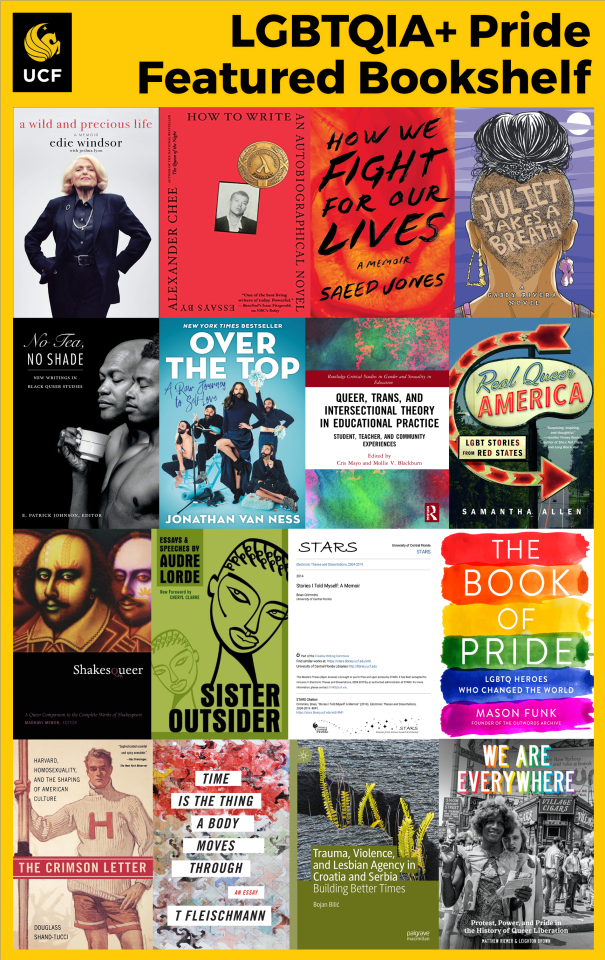
Ready to fly your flag?
Pride Month has arrived! While every day is a time to be proud of your identity and orientation, June is that extra special time for boldly celebrating with and for the LGBTQIA community (yes, there are more than lesbian, gay, bisexual, and transgender in the queer community). June was chosen to honor the Stonewall Riots which happened in 1969. Like other celebratory months, LGBT Pride Month started as a weeklong series of events and expanded into a full month of festivities.
In honor of Pride Month, UCF Library faculty and staff suggested books from the UCF collection that represent a wide array of queer authors and characters. Click on the read more link below to see the full list, descriptions, and catalog links.
With the Libraries’ on remote resource access, the usual extended physical display isn’t available so we have created a list of ebooks and streaming videos that you can access from the comfort of your home.
A Wild and Precious Life: a memoir by Edie Windsor
A lively, intimate memoir from an icon of the gay rights movement, describing gay life in 1950s and 60s New York City and her longtime activism which opened the door for marriage equality. Edie Windsor became internationally famous when she sued the US government, seeking federal recognition for her marriage to Thea Spyer, her partner of more than four decades. The Supreme Court ruled in Edie's favor, a landmark victory that set the stage for full marriage equality in the US. Beloved by the LGBTQ community, Edie embraced her new role as an icon; she had already been living an extraordinary and groundbreaking life for decades.
Suggested by Kelly Young, Administration
How We Fight for Our Lives: a memoir by Saeed Jones
Haunted and haunting, Jones's memoir tells the story of a young, black, gay man from the South as he fights to carve out a place for himself, within his family, within his country, within his own hopes, desires, and fears. Through a series of vignettes that chart a course across the American landscape, Jones draws readers into his boyhood and adolescence--into tumultuous relationships with his mother and grandmother, into passing flings with lovers, friends and strangers. Each piece builds into a larger examination of race and queerness, power and vulnerability, love and grief: a portrait of what we all do for one another--and to one another--as we fight to become ourselves.
Suggested by Sandy Avila, Research & Information Services
How to Write an Autobiographical Novel: essays by Alexander Chee
Chee’s manifesto on the entangling of life, literature, and politics, and how the lessons learned from a life spent reading and writing fiction have changed him. In these essays, he grows from student to teacher, reader to writer, and reckons with his identities as a son, a gay man, a Korean American, an artist, an activist, a lover, and a friend. He examines some of the most formative experiences of his life and the nation's history, including his father's death, the AIDS crisis, 9/11, the jobs that supported his writing--Tarot-reading, bookselling, cater-waiting for William F. Buckley—the writing of his first novel, Edinburgh, and the election of Donald Trump.
Suggested by Sara Duff, Acquisitions & Collections
Juliet Takes a Breath by Gabby Rivera
Juliet Milagros Palante is leaving the Bronx and headed to Portland, Oregon. She just came out to her family and isn't sure if her mom will ever speak to her again. But Juliet has a plan, sort of, one that's going to help her figure out this whole "Puerto Rican lesbian" thing. She's interning with the author of her favorite book: Harlowe Brisbane, the ultimate authority on feminism, women's bodies, and other gay-sounding stuff. With more questions than answers, Juliet takes on Portland, Harlowe, and most importantly, herself.
Suggested by Sara Duff, Acquisitions & Collections
No Tea, No Shade: new writings in Black queer studies edited by E. Patrick Johnson
This book brings together nineteen essays from the next generation of black queer studies scholars, activists, and community leaders who build on the foundational work of black queer studies, pushing the field in new and exciting directions.
Suggested by Jada Reyes, Research & Information Services
Over the Top: a raw journey to self-love by Jonathan Van Ness
Before he stole our hearts as the grooming and self-care expert on Netflix’s hit show Queer Eye, Jonathan was growing up in a small Midwestern town that didn’t understand why he was so…over the top. From choreographed carpet figure skating routines to the unavoidable fact that he was Just. So. Gay., Jonathan was an easy target and endured years of judgement, ridicule and trauma—yet none of it crushed his uniquely effervescent spirit. You’ll laugh, you’ll cry, and you’ll come away knowing that no matter how broken or lost you may be, you’re a Kelly Clarkson song, you’re strong, and you’ve got this.
Suggested by Kelly Young, Administration
Queer, Trans, and Intersectional Theory in Educational Practice: student, teacher, and community experiences edited by Cris Mayo and Mollie V. Blackburn
Queer theory, trans theory, and intersectional theory have all sought to describe, create, and foster a sense of complex subjectivity and community, insisting on relationality and complexity as concepts and communities shift and change. This collection brings these crucial theories together to inform pedagogies across a wide array of contexts of formal education and community-based educational settings.
Suggested by Anna Dvorecky, Cataloging
Real Queer America: LGBT stories from red states by Samantha Allen
Allen takes us on a cross-country road-trip stretching all the way from Provo, Utah to the Rio Grande Valley to the Bible Belt to the Deep South. Her motto for the trip: "Something gay every day." Making pit stops at drag shows, political rallies, and hubs of queer life across the heartland, she introduces us to scores of extraordinary LGBT people working for change, from the first openly transgender mayor in Texas history to the manager of the only queer night club in Bloomington, Indiana, and many more.
Suggested by Sandy Avila, Research & Information Services
Shakesqueer: a queer companion to the complete works of Shakespeare edited by Madhavi Menon
Exploring what is odd, eccentric, and unexpected in the Bard’s plays and poems, these theorists highlight not only the many ways that Shakespeare can be queered but also the many ways that Shakespeare can enrich queer theory. This innovative anthology reveals an early modern playwright insistently returning to questions of language, identity, and temporality, themes central to contemporary queer theory. Chasing all manner of stray desires through every one of Shakespeare’s plays and poems, the contributors cross temporal, animal, theoretical, and sexual boundaries with abandon. Together they expand the reach of queerness and queer critique across chronologies, methodologies, and bodies.
Suggested by Megan Haught, Teaching & Engagement/Research & Information Services
Sister Outsider: essays and speeches by Audre Lorde
In this charged collection of fifteen essays and speeches, Lorde takes on sexism, racism, ageism, homophobia, and class, and propounds social difference as a vehicle for action and change. Her prose is incisive, unflinching, and lyrical, reflecting struggle but ultimately offering messages of hope. This commemorative edition includes a new foreword by Lorde-scholar and poet Cheryl Clarke, who celebrates the ways in which Lorde's philosophies resonate more than twenty years after they were first published.
Suggested by Jada Reyes, Research & Information Services
Stories I Told Myself: a memoir by Brian D. Crimmins (UCF Thesis)
Stories I Told Myself: A Memoir explores the experience of growing up gay in the 1980s. It is one boy's journey toward self-acceptance set against the conservative backdrop of a rural community on California's central coast. The story illuminates the hunger for a life different than the one being lived, and the ever-present sense of being different exacerbated by bullying and unrequited love. It is a narrative of evolving identity, and includes cultural insights and societal context of the time period. The author poses a fundamental question, "How did I make it out of the 80's alive?" and he explores the answer with poignant humor and self-examination.
Suggested by Megan Haught, Teaching & Engagement/Research & Information Services
The Book of Pride: LGBTQ heroes who changed the world by Mason Funk
Captures the true story of the LGBTQ civil rights movement from the 1960s to the present through richly detailed, stunning interviews with the leaders, activists, and ordinary people who witnessed the revolution and made it happen.
Suggested by Megan Haught, Teaching & Engagement/Research & Information Services
The Crimson Letter: Harvard, homosexuality, and the shaping of American culture by Douglas Shand-Tucci
Historian Douglass Shand-Tucci explores the nature and expression of sexual identity at America's oldest university during the years of its greatest influence. The Crimson Letter follows the gay experience at Harvard in the nineteenth and twentieth centuries, focusing upon students, faculty, alumni, and hangers-on who struggled to find their place within the confines of Harvard Yard and in the society outside.
Suggested by Pat Tiberii, Interlibrary Loan & Document Delivery Services
Time is the Thing a Body Moves Through by T Fleischmann
Sebald meets Maggie Nelson in this autobiographical narrative of embodiment, visual art, history, and loss. T Fleischmann uses Felix Gonzales-Torres's artworks--piles of candy, stacks of paper, puzzles--as a path through questions of love and loss, violence and rejuvenation, gender and sexuality. From the back porches of Buffalo, to the galleries of New York and L.A., to farmhouses of rural Tennessee, the artworks act as still points, sites for reflection situated in lived experience.
Suggested by Sara Duff, Acquisitions & Collections
Trauma, Violence, and Lesbian Agency in Croatia and Serbia: building better times by Bojan Bilić
This book uncovers some of the major moments in the fragile and still poorly known herstory of feminist lesbian engagement in Serbia and Croatia. By treating the trauma of war, homophobia, and neoliberal capitalism as a verbally impenetrable experience that longs to be narrated, this monograph explores the ways in which feminist lesbian language has repeatedly emerged in the context of strong patriarchal silencing that has surrounded the armed conflicts of the Yugoslav succession. The book renders visible a surprising diversity of activist initiatives and the resilience of transnational affective ties, which testify to the creativity of lesbian activist mobilizations in the ambivalent semi-peripheral space that used to be Yugoslavia.
Suggested by Anna Dvorecky, Cataloging
We Are Everywhere: protest, power, and pride in the history of Queer Liberation by Matthew Riemer and Leighton Brown
Have pride in history. Through the lenses of protest, power, and pride, this is an essential overview -- and a visual record -- of the history of the Queer Liberation Movement in the United States. With exhaustively researched narrative and hundreds of stunning photographs, this sweeping book traces queer activism from its roots in the late-nineteenth-century -- long before the pivotal Stonewall Riots of 1969 -- to today, casting new light on many of the movement's trailblazing activists and organizations. Suggested by Christina Wray, Student Learning & Engagement
16 notes
·
View notes
Text
request
name: jay
pronouns: he/she/they
project type: original work
age rating: young adult
the project: two girls sort of in hate, sort of in love. forced to spend time together on an insane, international errand run through south-east asia, who then come to grow together as people and as lovers
genre / tropes: romance and comedy, i don't know all the tropes since i started writing it as scenes descend upon me from the lesbian magic witch land, but so far - childhood bosom best friends to we-barely-talk acquaintances to best friends to lovers, found family, magical realism, complicated web of relationships, sharing a bed, fake dating, queerplatonic best friends, really bad fucking pining, cultural miscommunication, different cultural courting practices, the tall grumpy one just wants to be taken care of and the short dominating bratty one is more than happy to, really obvious flirting but the parties involved claim this is what bros do, everyone ships it
i need a reader for: i'm writing about a love story between a pansexual cambodian woman with an adopted family (name is definitely weird looking since i googled up meanings) who had been in love with her nonbinary lesbian childhood best friend who doesn't stay in one place. the cambodian woman (sovanna) is culturally but not religiously buddhist but this influences a large part of her life. she believes wholeheartedly in family, living life quietly with her family, working for the family, the good asian daughter who is a bookkeeper for the family business. since I'm vietnamese myself who hasn't been in vietnam for long nor do I know much about khmer culture beyond what i could vaguely remember from 15 years back, it would be amazing if i could talk to someone who is cambodian but knows some vietnamese, with how vietnam went to the south and took cambodian lands in the past 300 years. i also will have these two characters travel to indonesia and malaysia for some time so if i could speak to some locals about general city layout, vietnamese/cambodian parts of town, that too would be super helpful! then i'd also like to get into contact with someone with academic expertise in the kingdom of champa, modern cham community in vietnam but also overseas and how would a vision of champa in modern time looks like. i'm also looking briefly into establishing a sort of unified lost kingdom of funan, based in the south of vietnam and east cambodia, which exists as a metaphor but also is a physical place
i require:
general questions and discussion: yes
in-depth discussion of plots and characters: yes
partial read (relevant sections): yes
full read: yes
character types to read for: main pov character, secondary non-pov character
erotica/nsfw/explicit scenes: no
triggers / content warnings: i may be justifying some controversial border conflict in south-east asia but i don't think i'm justifying imperialism
project length: estimated to be 60-90k in the final run, but by end of 2020 i will only have 20k written up
budget: i would like to know what going rates are so i can offer fair compensation
contact: [email protected] or jayjemjam#8006 (discord)
additional notes: i would ideally be relying a lot on the cambodian reader(s) so i'd like to maintain a long term partnership with them if they're happy to remain with me since this is a big ongoing project. however, i will be fine talking to the other reader roles i mentioned in my big chunk of requested paragraph with fair compensation of course - i also will need to speak to someone who might know a lot about vietnamese and cambodian sword making and names, along with made up south-east asian magical practices in a modern setting
1 note
·
View note
Text
wips list
this functions as a key to all of my wips, including ones i don’t actively write but still work on occasionally. in case you didn’t know, all of my wips include: poc, LGBT+ characters, disabled and non-neurotypical characters, found families, usually fantasy elements because i love magic, and often a little romance (which is usually accompanied by found families or tragedy, but for my romance-repulsed friends, there are still stories with no romance!)
key:
*: heavily connected stories
>: stories taking place after the events of Faye and Fate (a very distant future)
Closest to Complete (in order... ish)
Painted Cards: a group of teenagers end up criminals after a magical goddess chooses them for greatness. instead of embarking on some epic adventure, they decide to save the world another way: through kindness and coffee. a story about a found family made up of unintentional criminals with trauma that they’ll learn to cope with. mostly written for myself, but also written for the people in my life who needed to see characters like them have a happy ending. a very hopeful, fantasy slice-of-life story.
*Faye and Fate: almost everything i write is exposition or a result of this 5 book series. Aralion Faye resets the timeline so often it all just blurs together. with each new on she creates, she watches the ones she loves die over and over again, as if it’s all a video game culminating up to that game over screen. things always start out so innocently, too; her memories never return until later, so for a while, she enjoys attending a magic school, falling in love, playing pranks, befriending her peers. by the end of the year, the world comes back to remind her that her happy ending is unachievable. between traitors, corruption, fires, and cliffs... this time has to be different. this time she’ll save everyone she loves. is overall a story about heroes of all types. love this series so much abhddvk. magic is based on skills/interests: art, writing, engineering, astronomy, directing, zoology, architecture, makeup art, etc
*Mortals Versus Morals: (this isn’t actually the title but it makes me laugh so it’s being used as the placeholder) Glen is 17, rich, sheltered, and possibly the most lawful good person ever. plot twist- there’s a prophecy predicting his (as well as 6 others’) involvement in the end of the world, and they aren’t on the good side. Glen struggles to balance saving the world from villains while trying not to become a villain himself. includes: road trips and bonding, scenes like the one where the aro-ace friend gets seduced by a nine-tailed fox who runs a Burger King, everyone educating Glen on cultures and respecting pronouns :) as well as the occasional choking angst that comes with a bunch of almost adults getting dragged into the business of gods. did i mention there are gods? there are gods. i do kill a love interest of a protag but then give them TWO romantic partners because i’m not a coward (i feel like the characters who lose a love interest end up in a poly relationship most often in my stories... as a sort of apology to them lmao). also Utah? basically stops existing at some point. magic is based off a deity someone worships, with worship comes borrowed magic. the characters themselves are basically just omnists?
Beneath Our Skin: Sam and Ana don’t know each other. it’s by chance that they’re separated from their class during a field trip, and end of wandering straight into a portal to another world, one with magic. while searching for a way home, they accidentally make their own- in the meantime, they’re gonna find a magician who can give Sam a shapeshifting spell because Sam would really like to transition, even if it’s through magical means, please. written for me and my fake-brother, so lots of being platonically domestic and also sarcastic... this is in a really poetic writing style too.
House of Crabs: this is not the name it just makes me giggle so placeholder time! contemporary, no romance or fantasy or anything (although like one crime is committed but life is life that). here’s the old summary: Siera lives in the mansion of thirty year old Janelle, a woman who has the tendency to take in stray children, granting them shelter despite their tragic backstories or strange personalities. When one of the outcasts, Roy, is confronted by his biological brother, Roy is absolutely horrified by the concept of being dragged back to his transphobic family. The outcasts are dead set on protecting him, even if it requires breaking laws. But Roy's brother doesn't seem that content on harming Roy or bringing him home against his will. Instead, the boy seems more interested in coming out of the closet, hoping that his little brother and his new family can help him learn how to be his true flamboyant self.
>Obligatory Superhero Stories (3 stories):
----Lei is supposedly a civilian, until she arrests the man who ruined her life and accidentally ends up adopting his daughter, Hera. Hera coerces her into adopting her classmate Jason. the two get kidnapped. Lei gets annoyed by how useless she is in saving them, and becomes the first non-mutant superhero. in the meanwhile, the US Secretary of Powers, Victoria, is forced to monitor her progress for a court case deciding whether this is legal, and accidentally falls in love. Hera fucks with journalists and enjoys being politically smarter, Jason attempts to create a ground-breaking technology and blows up hundreds of phones, and Victoria never sleeps. literally. her superpower is just,,, no sleeping.
----Vessa becomes a superhero by accident. it involves art galleries, snow, and unlicensed doctors. now, she operates under an alias, the hero Froze (very creative, yes), alongside her trusted sidekicks. unbeknownst to Vessa, she has a history with the villain she’s fighting, and their teams may be more entangled outside of their aliases than first believed. basically, an enemies to family (and some lovers) story, involving a lot of morally grey shenanigans thanks to a corrupt society.
----there’s a villain on the lose, know as Heart-twist, with the ability to take someone’s darker emotions and intensify them. in reality, Sora is just a teenage girl, with four dear and near friends. it’s been a year since her sister’s boyfriend, a hero, prioritized glorious battle over rescue, and her sister died alone and afraid. Sora is just waiting to make him fall in love with her, so she can repay the favor.
>Paint Me a Picture: dystopian future! roughly 78% of the population is monochromatic, and can only see in shades of grey. it seems petty in plain sight, but jealousy has left the other 22% segregated, separated by a boundary and sinking in poverty. Pristaline is apart of the majority, privileged without even realizing it- her biggest concern is making herself a future in law. a car accident leaves her in a recover home near the boundary, where she accidentally meets Jackson, a color-seeing boy, who calls her eyes ‘blue.’ the encounter sparks a revolution. this is a sadder story- it ends with a girl, watercolor swatches, and a grave.
*Run From Wolves: Elayna is unfortunate enough to be a magic-born in the one kingdom that still prosecutes female magic-borns (to which she says, fuck their religion for saying women shouldn’t have magic). when she and her half-brother Shage are discovered, instead of being executed, Elayna is offered a position beside her brother in the kingdoms prestigious Goddess Guard. the offer comes with a price: they must swear allegiance to the king, and can do him no harm. luckily, a pretty spy from a neighboring kingdom offers Elayna a loophole. includes spirit animals, political intrigue, lesbians, murdering an asshole king, and a secret mystery involving immortality and wolves.
*Twin Kingdoms: there’s an island floating in the sky- two, now, split in half down the center. Melony and Serena have known about the conflict between their kingdoms, but they never really realized it’s intensity until Melony’s older brother close friend betrayed her and seized the throne for himself, pitting her kingdom against Serena’s and searching for war. Melony and Serena are able to escape together, living in disguise and biding their time before they can retake what belongs to them. has a really fun character who’s a villain (she’s the traitor brother’s little sister), gets stuck with an injury, is healed by a girl in an enemy village, and struggles to reaffirm her beliefs while vaguely falling in love. sighhhhhh i miss this series
*Where Shadows Bloom: written during the time of my life where i loved badass assassins becoming queens or princess... despite the trope being looked down upon, i hold this dear to my heart. basically, there’s a period of turmoil throughout the entire planet. on one end of the world, the queen is assassinated by a girl aiming to use her throne to destroy her noble parents, an underground group seeks to end slavery through magical battles and underhanded deals, and an orphan boy is made king. on the other side of the world, a second world war rages, pitting the Gold Alliance (good guys) against the Silver Alliance (bad guys). a princess goes undercover, venturing into a captured kingdom to spy on opposing forces. she’s taken in by an engineer/pilot who helps her stay in disguise as she uncovers the nefarious plot that involves the prosecution of an entire people. it all ties in together.
*Fateless: i really can’t get enough of magic and princesses, huh. ever wonder what Arthurian mythology would be like if it was in my world? Raine’s family has known tragedy after tragedy, from the death of her uncle, then aunt, her brother, and finally, her parents. fate has left her alive to inherit their throne when she comes of age. still, even she is cursed, wearing a ring that burns her with the pain of her people. she doesn’t wince anymore, not even when she watches another witch burn at the stake, and feels the flames crawl up her body, phantom but so, so real. when her kingdom falls, Raine and her most trusted knights are forced to flee into the woods. there, they find a tavern alongside a their road, run by a mysterious woman named Lancelin. there’s something familiar about the woman, something from Raine’s past, and something strange about the way that each of her customers leaves with healed minds and bodies. secretly-enemies to secretly-lovers! as common with me...
8 notes
·
View notes
Text
There is something people can’t talk about regarding the Dalish
So let me talk about something, and I don't know how to preface it so let me just come right out and say it.
I feel like there's this unspoken rule that the Dalish can't be criticized, and there also seems to be this unwillingness to ascribe negative traits to their culture that we would otherwise assume of other cultures, fictional or real.
I say this because I *feel* it. I feel as though I can't write anything critical of Dalish without people assuming that I'm somehow an imperialist or something, that I'm badmouthing an indigenous group because *that's just what's been done*.
Let me try to explain.
So we have the Dalish, a group of people whose plights and history can be equated to that of the Jews (rumors of blood libel and child sacrifice, forced conversion, their brethren being sequestered in ghettos in the cities, frequent victims of attempted annihilation, scapegoats for mishaps that happen in human villages and such); indigenous peoples (living in non-urban societies that worship polytheistic deities, the original backstory prior to the revelation in Trespasser aligns with slow erosion of their culture through human settlements and disease, victims of attempted annihilation, considered barbaric for their rustic lifestyles); and Romani/Sinti (nomadic, located on the outskirts of established societies, also victims of scapegoating).
Okay, we got that out of the way. We have that established.
But can we also be completely honest with ourselves and say that the Dalish are NOT a monolithic group of people but also have cultural variations? The only things that tie them together is the fact that they are elves that worship Elvhen gods, they wear vallaslin, and they are nomadic. That's basically it. That's all we really know about them from that. Beyond that, the canon, the creative minds behind Dragon Age, and the offical outside sources like art books, novels, and comics clearly establish that there are differences in dialect, relationship with humans, their views of magic, and even their views of sexuality.
That last one is what I want to talk about most.
This is a game series that has been a refuge for non-straight people. The universe is accepting of LGBTQA people in a way that few other game franchises, if at all, have. I get that. I understand wanting to preserve this great source of representation and acceptance that runs through the game's universe. There is also the turning of stereotypical fantastical racism on its head. The parallel between the treatment of the Dalish and indigenous peoples is great politics. I love learning about it. I love talking about it in the context of the story and as a reflection of real-world history, but...
What I'm trying to get this conversation to point to, really, is the fact that I see that people are unwilling to entertain the idea that some Dalish clans may not in fact, gasp, be necessarily LGBTQA-friendly, but more specifically, Lesbian-Gay-Asexual*-friendly.
It seems to be a kneejerk reaction to assume that a marginalized group will accept another marginalized group, and there's somewhat of a real-life precedent for it, given that gender roles were less strict in certain native tribes than in Europe, what with two-spirits and similar concepts. Now that is very valid, and there may indeed be Dalish tribes that believe in that sort of thing...
When the controversial user FenxShiral was still on here, he answered questions about language and Dalish culture. These were all his headcanons, and some of the ones where he offered his opinion on how the Dalish viewed certain sexualities drew the ire of some members of the Dragon Age community.
If I remember correctly, he said that not all clans accept homosexuality, and asexuality is also considered odd. People thought he was being homophobic and acephobic.
But here's the deal, and let me try to expand upon this without sounding too ADD.
--
If we go all the way back to the Old Testament of the Bible, there is a lot of talk of who can't sleep with whom and how you can sleep with this person and why you can't masturbate and all that. Now think of the context: These are tribes emerging to carve out a stable civilization. Death is commonplace. Famine, drought, war, and disease is commonplace. Infant mortality is high, on average. Grown adults die off easily. For the sake of the tribe or clan surviving, babies need to be made and be made regularly. Let's ignore the institution of marriage for a moment because that's about property and assuring a family line is kept intact...there is no room for gay people who are unwilling to make babies in this society. There is no room for asexuals* who do not want to have sex or have children. There is no room for people who do not want to do what's "best for the community" and give up their personal happiness for the sake of the tribe or clan. That is the fact of the matter.
A lot of LGBT activism and thought intersects with individuality and personal autonomy. "I am LGBTQA. What I do sexually is my business. I owe nothing to no one else." This is a very MODERN way of thinking, this idea that you should make yourself happy and that people should leave alone what does not affect them. Tribes and small-knit communities are not very individualistic by nature because they require full participation and equal amounts of sacrifice from everyone in order to keep the wheel turning, to keep the clan alive. These are societies that do not have an excessive amount of people that could do with 10% of women not getting pregnant or a few men choosing not to impregnate people. They can’t survive a major upset that could suddenly wipe out half their tribe and have one in five be unwilling to help resupply people.
As for the argument of "Well, what if they are gay and are willing to get someone pregnant/become pregnant, but still want a same-sex lover?" I would say that religion could likely come into play. Either the society will say "okay, I'll allow that cuz kids are getting made and that’s what I’m asking for" OR they'll say "doesn't matter, sex is for procreation only".
But going back to the Dalish and homosexuality. We have no proof that all Dalish are LGBT friendly. In fact, I would argue that it is the direct result of the small number of them that AT LEAST SOME CLANS would be less inclined to allow clan members to remain exclusively in same-sex relationships because it would mean fewer Dalish children are being made. That's going to be two women not carrying children and two men not impregnating. The Dalish are always struggling to keep their numbers up. On the one hand, the cities are dens of disease and violence, on the other hand, the Dalish have to contend with the elements, wild animals, and the wrath of local lords and peasants who want to run them off their camping grounds. Then there are those who wish to leave for the cities, or who fall in love with city folk. It is implied that certain tribes consider clanmates who match up with humans or non-Dalish to be "half-breeds" of a sort, "traitors" to their People, and it varies as to whether children of this union will be accepted by their Dalish family (as far as I know, this contrasts with the typical custom of North American native tribes who would readily accept mixed race children into their tribes).
The Dalish love children because children are great, yes, but also because they are a living future legacy. Someone who refuses to impregnate/get pregnant is not acting with the future survival of the clan in mind. Same thing with someone who is gay and does not want to carry a child or help conceive one. Now there may perhaps be a window open for the gay uncle or aunt to help rear children, but the Dalish obviously have developed a culture that values lots of kids because it is an unmistakable sign that their customs and traditions will carry on into the future.
So I guess what I'm trying to get at here is that not just the fact that the Dalish may be less tolerant of gays than you want to believe, but that being against homosexuality may not have anything to do with reasons like "gay sex is eww" or one's faith but that it could come from a utilitarian or pragmatic standpoint, cultural or existential or what-have-you. It's the same reason why the Tevinter Imperium is "anti-gay". It has nothing to do with the fact that homosexuality is bad, necessarily, because like in Greece and Rome there were context-heavy situations where it was allowed and tolerated, but because being exclusively homosexual and refusing to even pretend to "marry the girl" and have a kid jeopardizes this particular society's eugenic-based infrastructure: The upper class NEED to breed with each other to have perfect mages that will breed with other perfect mages to have more perfect mage children. This maintains the status quo and the hierarchy. As an Altus you can have a boytoy elf slave, you can probably even canoodle with a man of a lower class because you have that social superiority, but you cannot canoodle with another Altus because it's distracting both of you from your duty of siring children.
Now I’ll bet I’ll get people coming out of the woodwork accusing me of trying to justify homophobia or acephobia, but I’m not. I’m Bi and I guess a bit Asexual. I’m trying to explain why it is not homophobic or acephobic to entertain the idea that some Dalish clans may be more leery of gay or asexual* clan members. Again, the Dalish are not a monolithic group. They are a bunch of different elf family groups that have rejected the Chantry and human civilization. Beyond that and a few cultural staples, they operate fairly independent of each other and developed their own way of maintaining their autonomy and existence.
It is like how anti-capitalists are also not a monolithic group. The only thing they share among them is their rejection of capitalism and perhaps even share reasons why they hate it. Beyond that, the proposed alternatives vary widely from socialism to anarchy.
* Specifically, those who are sex-repulsed/disinterested
19 notes
·
View notes
Text
Sex, sex, sex and so much more in Blue is the Warmest Color
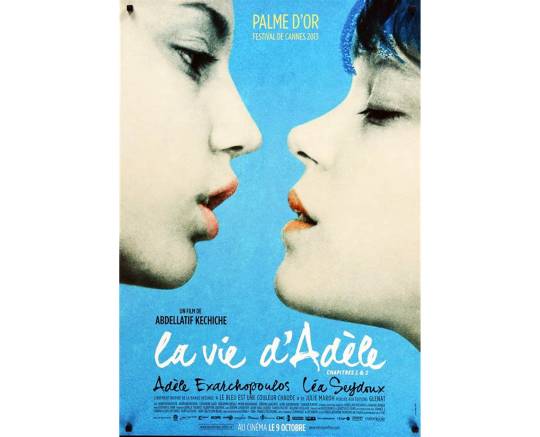
The French film, Blue is the Warmest Color was released in 2013 and directed by, Abdellatif Kechiche. It follows the story of a young woman named Adele who faces crises with her queer identity. The film begins with Adele facing pressure from her peers to have a relationship with a boy named Thomas. On her way to her first date with Thomas, Adele passes a young blue haired girl in the street and later has a sexual dream about her. This scene is the audience’s first glimpse into Adele’s queer identity. Later in the film when she officially meets the blue haired girl named Emma, an art student in university, at a gay bar the audience begins to see Adele’s queer identity unfold and come to life through their relationship. While this film does work to bring attention to queer elements that are so often missing from films, it also falls victim to heteronormative and hegemonic values in the way that it presents Emma and Adele’s relationship.
The relationship between Adele and Emma seems to follow a similar arc as any other romantic film. They first officially meet at a bar as some type of “meet cute” and Emma later seeks Adele out at her high school, and they have a romantic moment on a bench while Emma sketches Adele. Though unlike the heteronormative romantic films often seen, Blue is the Warmest Color also functions as a queer breakout film. Andre Cavalcante (2017) in his article “Breaking into Transgender Life: Transgender Audiences’ Experiences With “First of Its Kind” Visibility in Popular Media” defines breakout texts as “media that portrays “first of its kind” representation” to a marginalized group. While this film is not about Trans characters like the ones Cavalcante analyzes in his article, the film does work to represent queer women’s lives in a way that is not often presented in mainstream media. One of the ways that the film does this, is through its representation of Adele and Emma’s sexual relationship. While the sex scenes throughout this film are striking and even at times uncomfortably long, they give queer women a sexual visibility that is rarely seen.
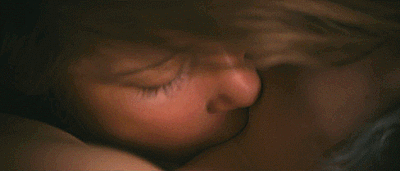
The sex scenes that occur in the film not only occur in a queer context meaning that it is not prompted by a male third party, as we see in other hegemonic films, but the content is also extremely explicit. They show the female body in a realistic and raw way. They do not hesitate to show female genitalia, and in doing this they break patriarchal boundaries that demand modesty and concealment of the female body. The scenes also give visibility to queer women that is not through the Heteronormative male gaze. The sexual interactions are by women and for women and unlike the Canadian queer film, Below Her Mouth that also has female sex scenes, they are not all focused around a strap on.
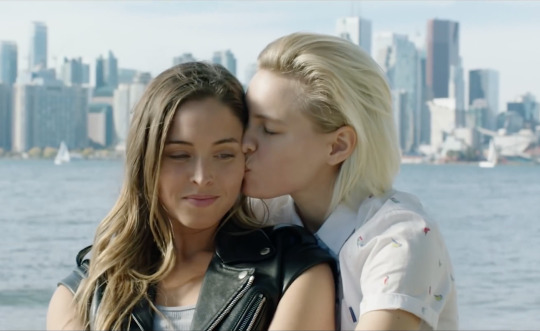
While queer women can and do use strap ons in real life, the persistence of it in every sexual encounter in Below Her Mouth presents a binary and heteronormative view of female-female sexual relationships and re-enforces the idea that one of them is “the man.” The sex scenes in Blue is the Warmest Color also present a reciprocal sexual relationship, where in neither of the characters seem to be the “dominant” or “submissive,” and a power dynamic between the two, at least in this point of the film, is non-existent. This works against the heteronormative narratives that are so often portrayed in romantic films where one character (typically the man) has more control over the other character. The film also makes the sexual interactions between the two women appear to be consensual, and while this doesn’t happen in the form of either party asking or saying yes, the scene does include mutual participation unlike typical heteronormative sexual encounters seen in films where one party seems to be resisting for one reason or another, and the forcing of the sexual interaction somehow leads to consent.
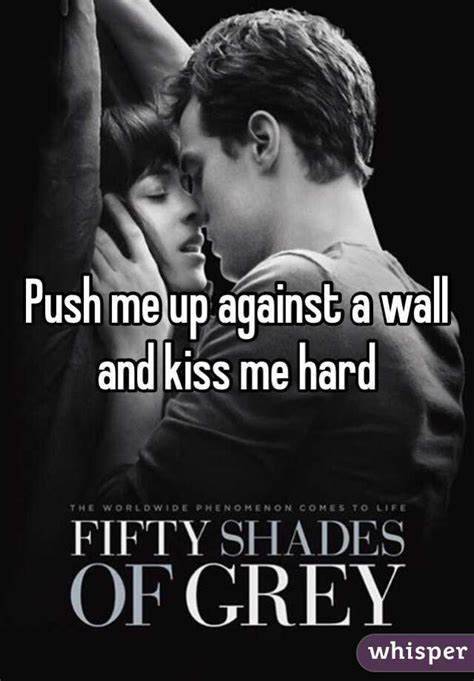
Even though this film uses sex scenes to break patriarchal barriers and gives visibility to queer women, as Cavalcante also discusses in his article the short comings of breakout texts such as Blue is the Warmest Color come in their tendency to fall into hegemonic tropes and feed stereotypical narratives. To start, Adele and Emma externally fall into normative ideas of queer female couples. Adele is the innocent femme character and Emma is her butch lover. Later in the film, Adele pursues a career as a teacher and takes on the domestic role, while Emma is a rugged artist.
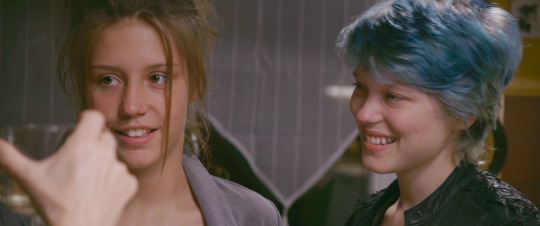
This depiction of the characters falls into binary and heteronormative values and reinforces the idea that a queer relationship needs to mimic straight ones by having a “man” or masculine partner and a feminine partner. In addition, the age gap between the two characters is also worth discussing. While without knowing that Emma was much older than Adele, the audience may assume their ages were similar, but the audience is explicitly told that Adele is 15 while Emma, in her fourth year of university, is assumedly around the age of 22. While, this age gap is not huge, it is still large enough that in contemporary western society it raises some red flags. Not only does this age gap seem strange to include, but it also reinforces narratives surrounding the idea that the queer community is filled with pedophiles and is out to corrupt the youth. This is also played out when Adele cheats on Emma with a man and throughout the rest of the film the audience never sees her have any interactions with any other women.
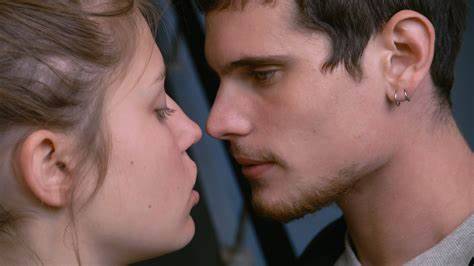
This is problematic because not only does it make Emma and Adele’s relationship seem like some sort of fad that Adele was seduced into by the older Emma, it also suggests that femme women are inherently straight. Adele’s lack of interactions or relationships with women other than Emma, and in contrast Emma’s multiple female relationships throughout the film suggest that feminine women like Adele are inherently straight and that to be truly queer you must be butch like Emma. Similarly, Adele never comes out to her family or friends and her being closeted is almost never mentioned, and even when she does eventually have Emma over to her parents’ house it is under the guise that Emma is just her friend. This is problematic because again it suggests that if you do not externally look queer, then it is easier to stay in the closet. While as discussed in Bonnie Dow’s (2010) article on the Ellen coming out episode, an individual’s coming out is not “taken to imply the success of the discourse” around queerness, it seems for a film such as this it would be important to include. To not include one of the main queer characters coming out at all suggests a shame around queerness that is perpetuated, and not addressed or corrected through Adele’s story.
Overall, Blue is the Warmest Color presents its audience with a raw version of queer female-female relationship, but the way that I experienced the film is probably much different from a queer identifying female. While I was watching the film I thought of Alexander Doty’s (1993) piece Making Things Perfectly Queer: Interpreting Mass Culture, in which he describes that in the same way that “heterocentrist texts can contain queer elements […] heterosexual, straight-identifying people can experience queer moment(s).” While Doty discusses this in terms of queer readings of straight texts, it applied to my experience watching the film, because during the raw and unfiltered sex scenes I did experience queer moments. Though despite my queer moments, I do understand that my analysis is very skewed because despite being a feminist and having knowledge through gender studies classes, I have not had queer experiences. Therefore, for me to say that the film depicts “real” life queer female relationships and even queer female sex lives may be an over exaggeration. Especially the scenes where the women are “scissoring” stood out to me as being potentially stereotyped though again, I do not belong to the queer community, have not experienced a female-female relationship, and have not discussed female-female sexual relationships with queer women and can not speak to the accuracy. It is also notable that I have not seen an abundance of French films and so the nudity in the film that I describe as being liberating or forward may simply be part of French culture/films.
Sources:
Cavalcante, A. (2017). Breaking Into Transgender Life: Transgender Audiences Experiences With “First of Its Kind” Visibility in Popular Media. Communication, Culture & Critique, 10(3), 538–555. doi: 10.1111/cccr.12165
Doty, A. (1993). Making things perfectly queer: interpreting mass culture. Minneapolis u.a.: Univ. of Minnesota Press.
Dow, B. (2001). Ellen, Television, and the Politics of Gay and Lesbian Visibility. Critical Studies in Media Communication, 18(2), 123–140. doi: 10.1080/07393180128077
Kechiche A. (Producer), & Kechiche, A., Maraval V., Chioua B., Lemal G., Martin A. (Director).(2013). Blue Is the Warmest Color [Film]. France.
Mullen, A. (Producer), & Mullen, A. (Director). (2017). Below Her Mouth [Film]. Canada.
youtube
6 notes
·
View notes
Text
Queer as Folk, but make it diverse
Ever since I watched Pose, I’ve been thinking about how there is this one TV show where I would actually like to see a remake of and that’s Queer as Folk.
Now, not a remake as in “new actor to play Brian Kinney”, because Brian’s story - and everybody’s story - has been told. I can rewatch the show for that.
A remake in the sense of taking the essence of this show and creating something new with it. The very core idea of a show that is simply literally queer as folk.
Because, quite frankly, Queer as Folk was neither of those. Neither was it queer, nor was it “as the folk”. It was a show that followed a circle of Young White CIS Gay Men, with one Token Old Gay (who was also CIS and white), one Token Lesbian (who, again, CIS and white) and one Token Bisexual (who, aside from CIS and white was also a really bad stereotype of “bisexuals can’t be faithful! She exclusively got pussy for years now so she needs to cheat to get some dick!!!”, which was honestly just yikes).
And honestly, I get it. This show was a testimony of its time. It was groundbreaking for its time, because it was nearly exclusively gay. It showed gay people in various, normal, human situations - not just as the stereotypes that served the straight lead characters. And back then, things were white. Things were male led.
So I’d love to see an updated version of it. Because that’s something that’s missing in today’s TV landscape - something really truly very unapologetically gay.
I love Pose, but much like Queer as Folk it takes one flavor of the rainbow and focuses on that - it does that very well and it’s amazing to watch. So, this post isn’t meant as “Pose isn’t good enough”, it’s brilliant at what it does. But it’s limited and also a period piece, of sorts.
I want a show that’s thoroughly queer, that shows different shades of the rainbow, on people with different backgrounds and that also shows different age groups.
Now, I’m not an idiot. I know you can’t just throw 10+ main characters with various sexualities at people all at once.
(This is the part where I get very specific about what I would love to see, but that is only meant as an example because this post is more about the concept.)
Let’s start the show off simple enough, with the “big four”, if you will. Cover the LGBT letters as the four first, core main characters we meet. Because four characters, you can establish them well enough, there’s not too much to confuse you or distract you.
For the sake of the example, let’s give them super on the nose names. Lesley the lesbian, Gary the gay man, Bill the bisexual man and Tracy the trans woman.
Tracy is straight, because I feel as though that is very often something that is forgotten; trans characters are often only portrayed to be included in the community if they are also on top of it gay.
Tracy and Bill used to date, Bill and Gary are currently a couple while Lesley is Tracy’s roommate. Just, you know, as an example as to how our main characters could be introduced.
You establish the core four, you flesh them fully out, you give them backgrounds - maybe Bill is a Korean American man, Gary is probably white because let’s face it TV shows nowadays still need a White Man in it for some reason, let’s say Tracy is a strong, black woman, Lesley is a Latina.
We establish them. We establish healthy relationships. Show how Gary and Bill can be in a happy relationship without the bisexual man cheating because what the fuck why even. Show a healthy relationship based on trust, on the knowledge that Bill can be friends with his ex Tracy without there being some “will they, won’t they”. Show that a lesbian can live together with a woman without falling in love with her. Show good friendships, solidarity within the community, show that queer people can have healthy romantic relationships.
Maybe half-way into season one, Lesley gets a girlfriend. To bring in a bi woman - let’s call her Bianca because we’ll stay on the nose with the names so it doesn’t get too confusing.
And that’s how we can start branching out. Bringing in love interests, but not the way straight shows do. Where the one gay main character has a love interest for like a season but then they break up and the love interest immediately leaves the show to never be seen again, even though the whole season was spent on them forging bonds with all the friends and main cast. No. Let ex lovers stick around, find new lovers of their own, make friends.
One by one, we introduce new characters, characters who may start out as secondary characters and over the course of a season gain importance, characters who start out as love interests or as new neighbors.
Give me Pandora the pansexual ex-girlfriend of Lesley, Grace their ace neighbor, Aron the aromantic owner of the café they always get their breakfast, Queenie the queer cousin, sorry I really can’t make up a good semi-pun name for a non binary character but definitely also a non binary character and a genderfluid character, and so further and so on. And I only give one example per sexuality and gender identity here, but that doesn’t mean there has to be only one - there could be five bisexuals, we could meet three aces, I just mean that there has to be at least one of each, because I want all the rep.
Like I said, I don’t want 10+ characters of various ethnicities and sexualities thrown in my face in the first season. That’s too much to focus on and too wild and wouldn’t give anyone the time they deserve. But I’m talking about the span of multiple seasons here.
Start off with those core four, branch out through lovers (past, present and future), neighbors, friends they made in the community. Maybe they live in a particularly gay neighborhood, maybe one of them works at a queer youth center so we can meet some of those other characters through that, bringing in the perspective of teenagers - closeted, struggling, out and proud, bullied, all the shades there are. An actual, physical place where we can have all this rep, not just your usual variety of straight white suburbs.
Give me old gays, who were there during the AIDS crisis, who were actually there during the Stonewall riots, who have a story to tell. Maybe a cute, old couple that’s living in their apartment building.
I just - I want to see more. I’ve seen the Gay White CIS Man so many times now. Pose showed me something I never even heard about. How could I, I’m a white CIS lesbian from Europe. The ballroom scene? Never heard of it before, because it never made it into major media before. I want to hear those stories. I want to see the queerness in other cultures. I want to see other queerness - because if we get rep, it mostly boils down to gays, lesbians and bisexuals, very rarely do we get some trans rep, but beyond that? You’re lucky if you get one in 200 shows.
I want Queer as Folk, with characters who are queer, not just gay, who show us just how many colors the rainbow has and who actually represent the folk, the real people of today with all of their own cultural backgrounds.
That’s a TV show I’d be dying to see.
#Queer as Folk#LGBT+ Representation#TV Show Pitch#this is random#but it helps me get those obsessions#outta my head#when I write them down#and I REALLY want this
31 notes
·
View notes
Text
Top 10 Anticipated LGBT Reads of 2019
1. Willa & Hesper by Amy Feltman
Release Date: February 5th
What It’s About: Two women, Willa and Hesper fall in love in a whirlwind romance. However, when the romance begins to fall apart they turn to their roots for comfort. For Hesper, this means returning to her grandfather’s home of Tbilisi, Georgia and trying to fill in the gaps of her family history. Willa joins a Jewish group to visit some of the Holocaust sights in Germany and Poland. Through looking to their pasts, both women find a way to look towards their future.
Why I’m Interested: Jewish!! Lesbians!! Beyond that, I’m interested in the complicated relationship between the women and the way they explore their relationships with each other as well as their past and culture. It sounds beautiful and heartbreaking I can’t wait to read it!
2. Real Queer America by Samantha Allen
Release Date: March 1st
What It’s About: Samantha Allen, a once Mormon missionary now turned Daily Beast reporter and happily married to a woman, has always had a deep love for the ‘Red States’ in America and the American South. In this novel she takes a road-trip of sorts to introduce us to real life LGBT people in said states in order to give them a voice and chance to tell their stories.
Why I’m Interested: This is a collection of true stories about LGBT people in the Bible Belt written and compiled by an ex-Mormon trans woman and I’m a lesbian who grew up Mormon and now lives in Utah, so there’s definitely a personal connection for me here. Beyond that, I love getting to see/hear the voices and stories of actual LGBT people because it’s just such a comforting reminder that there are so many LGBT people out there.
3. The Parting Glass by Gina Marie Guadagnino
Release Date: March 5th
What It’s About: It’s the 19th century in New York and Mary Ballard is a ladies’ maid to wealthy socialite, Charlotte Walden. Little known to Charlotte, Mary is actually Irish immigrant Marie O’Farren whose feelings for her go far beyond the platonic. Meanwhile, Mary’s brother, a stable groom, is also enamored with Charlotte. Between Mary’s night escapades in New York and the class-breaking love her brother holds for Charlotte, The Parting Glass explores class, race, and sexuality in 19th century America in a way that feels new and fresh.
Why I’m Interested: The summary of this reminds me a lot of a Sarah Waters novel, who is like the queen of lesbian historical fiction. I love complicated relationships, vintage gay ladies, and drama and this book promises to have it all! I recently bought a copy of it so now it’s all just a matter of actually reading it!
4. Crossing by Pajtim Statovci (trans. David Hackston)
Release Date: April 2nd
What It’s About: Bujar and Agim, two friends growing up in the shadow of post-communist Albania decide to move past their individual hardships and struggles by moving to Italy. However, Italy poses its own difficulties for each boy as they explore their connections to home and history as they search to forge new identities and find belonging.
Why I’m Interested: This is the first of two translations on this list and I honestly can’t tell you how happy I am to get some more foreign LGBT literature. I don’t think I’ve ever read a novel about Albanian characters, which is thrilling enough but there are LGBT Albanian characters?! Sign me up! It sounds like it’s going to be hopeful and maybe a little heartbreaking and I’m here for it all.
5. Courting Mr. Lincoln by Louis Bayard
Release Date: April 23rd
What It’s About: Told in alternating voices between the two people who knew and loved him most, Louis Bayard paints a portrait of the famed president that few have seen before. When Mary Todd, a quick-witted debutant, meets potential presidential candidate Abraham Lincoln, mutual love and appreciation between the two grow rapidly. Watching in the middle of it all is Joseph Steed, Abraham’s roommate and closest friend, who also cares deeply for the soon-to-be president. A warm, meticulously researched novel that introduces the reader to the lesser known aspects of Lincoln’s life and the people who loved him.
Why I’m Interested: I must confess, I don’t actually know how gay this is going to be. However, the summary does mention that it will be exploring Steed’s perspective as well, and addressing the complicated nature of his and Lincoln’s friendship. Hopefully, we’ll get a glimpse of something more than just platonic in terms of feelings between them, whether those feelings are acted upon or not. Either way, I’ve heard the perspective of Mary is super well written and I really want to see that. It’ll be an interesting read and I’m excited to get my hands on it!
6. Lie With Me by Philippe Besson (trans. Molly Ringwald)
Release Date: April 30th
What It’s About: A chance encounter with a man outside a hotel causes our narrator, Philippe, to turn to the past to remember his first love, Thomas. The relationship began and blossomed their senior year in 1984, hidden in the shadows due to the nature of the time. However, their passionate, stolen moments continue to haunt Philippe to this day. Well loved and critically acclaimed in France, Molly Ringwald brings the story of first love to life for American audiences for the first time.
Why I’m Interested: Yes, it is translated by that Molly Ringwald and if that’s not intriguing enough, the plot sounds right up my alley: a (potentially) tragic love story, set in a different time period, and in a foreign country. This novel was very well received in Besson’s home country, France, and it’s definitely on the top of my hype list!
7. Mostly Dead Things by Kristen Arnett
Release Date: June 4th
What It’s About: The suicide of Jessa’s taxidermist father hits her family pretty hard. Jessa is left to keep the family business afloat, her mother keeps making sexual art with the taxidermied animals, her brother withdraws from the family after his wife, who Jessa has secretly been in love with, bails. Mostly Dead Things is a darkly funny exploration of family and loss and one of the most anticipated debuts of 2019.
Why I’m Interested: The lead is a lesbian taxidermist - how can I say no to that? I’ve also heard this is wildly weird and charming and honestly there’s not quite enough LGBT novels that are just bonkers to read so thank god we’re getting some weird gay literature! This has gotten a lot of early hype and I’m hoping it will follow through for me!
8. On Earth We’re Briefly Gorgeous by Ocean Vuong
Release Date: June 4th
What It’s About: Little Dog, a man in his late 20’s, writes a letter to his mother who cannot read. In it he describes the history of his family and their connections to Vietnam. Poetic and tender, Vuong explores the complicated love between mothers and sons and the connections to the past as well as presenting a deep, timely discussion of masculinity and race.
Why I’m Interested: I own Ocean Vuong’s poetry collection Night Sky With Exit Wounds and while I haven’t finished it quite yet the poems I have read are beautiful and dreamlike. Hopefully this will translate well into his first foray into prose and I cannot wait to read it!
9. Cantoras: A Novel by Carolina de Robertis
Release Date: September 30th
What It’s About: Beginning in Uruguay in 1977, Cantoras traces the history of five women who discover a hidden cape, Cabo Polonio, that becomes a sanctuary for the women in a time of political dissent and turmoil. Throughout the next 35 years their lives shift and change in radical ways, but they all inevitably find themselves drawn towards the cape as they move through life and the challenges it brings.
Why I’m Interested: This checks two of my favorite boxes: a historical setting and a foreign country. Also, the summary makes it sound like it’s exploring the relationship between multiple women. I’m thrilled that so many 2019 novels are about exploring relationships between women, and this book adding wlw voices into the conversation is such a great bonus. De Robertis’s last novel, The Gods of Tango, dealt with similar themes and was extremely well received so fingers crossed this is this same!
10. On Swift Horses by Shannon Pufahl
Release Date: November 5th
What It’s About: In postwar America Muriel, a newlywed, moves with her husband from Kansas to San Diego, where she grows lonely and misses home, her mother who died before she turned 19, and her brother-in-law Julien. Julien, a thief and a free spirit, has taken to Las Vegas, where he works as a dealer, and falls in love with Henry, a devious card cheat. To escape the crushing realities of her new life Muriel begins visiting her local racetrack as Julian explores the Tijuana nightlife after Henry is run out of town.
Why I’m Interested: This sounds like a wild and exciting historical epic of sorts. We’re talking about thieves, Vegas, betting on horses, and extended family relationships and I really don’t know what’s not to love about this novel so far. This will be an exciting read, already compared to great western writers like Cormac McCarthy and Annie Proulx, and November frankly is starting to seem like too far away.
+1 Leading Men by Christopher Castellani
Release Date: February 12th
What It’s About: It’s July, 1953 when Tennessee Williams and his lover, Frank Merlo, first meet Anja Blomgren. Even in the glamour of Truman Capote’s Italian party, the (fictional) Swedish actress makes a lasting impression on the famed playwright and their chance encounter will drastically change the rest of their lives. Ten years later Frank is dying and Anja now lives as a recluse but both of them each have strong connections to that summer that they cannot let go.
Why I’m Interested: I’m a deep lover of Tennessee Williams and his work; I have been ever since I saw the film adaptation of A Streetcar Named Desire when I was a young girl. I’m intrigued to see how Castellani explores the life of and loves of a great artist, especially because while I love Tennessee I don’t actually know much about his life, as well as seeing how well he mixes both fact and fiction. This has already been released and has gotten great reviews so far, so needless to say I’m excited!
56 notes
·
View notes
Text
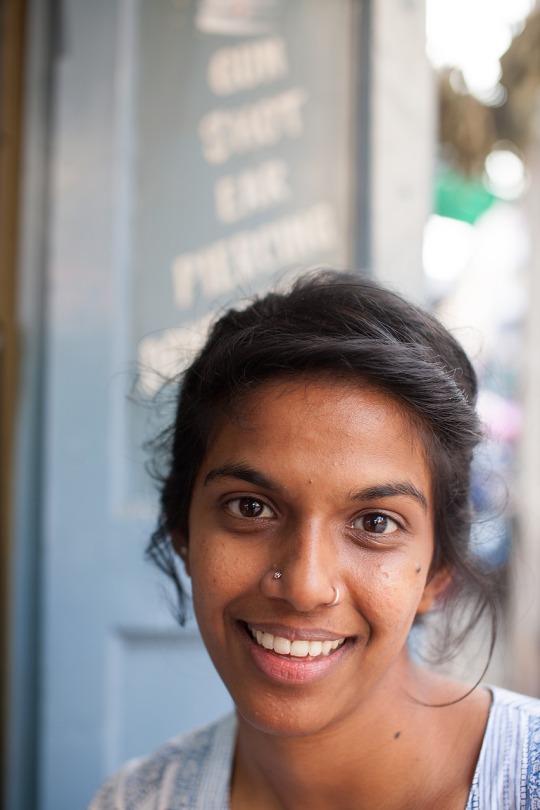
Subha: Women and Media Collective is a feminist organization [is] one of Sri Lanka’s really early, more established feminist organizations. It was started in 1984 by three feminists and it led to the seeding of many other feminist organizations around the country. As a feminist organization, we have been engaging in sexuality as a core feminist issue for many years. But I think the work with OutRight was really important because it gave us an opportunity to really focus our work on sexuality in the current context. Over the last few years, [the work on sexual rights] became tied to SRHR, sexual and reproductive health and rights, particularly advocacy around reforming the abortion law because abortion is also criminalized in Sri Lanka. So we were getting stuck in a very health, medical approach, and also a very heteronormative approach to SRHR, which is what advocacy around abortion law does. It kind of automatically locks you into talking about straight women’s health basically. So I think that the work on this project with OutRight really gave us an interesting opportunity to re-energize our own politics and our own work around sexual orientation, women and gender non-conforming people, around queer feminism, which is good.
OutRight: Did you ever get any kind of push back working on these issues in Sri Lanka? Did you ever have any kind of difficulties maneuvering these issues within the larger feminist movement?
Subha: Oh absolutely, I would actually hesitate to even call it a larger feminist movement. I think the larger women’s movement is not always necessarily feminist. And I think those two things can be sometimes in the same basket but sometimes also visibly not in the same basket. And I think, feminist movements should always have LBT rights at the center of our agendas. I think it’s when we lose the feminism in our women’s movements that we also tend to sideline [non-conforming] sexual orientation and identities. We [Women and Media Collective] want to really work with Sri Lankan women’s movements, to realign their politics to say sexuality and gender is a key feminist issue, it needs to be at the center of our agendas and cannot be an afterthought, cannot be at the margins.
We’ve [Women and Media Collective] done advocacy related to key national processes that have been happening in Sri Lanka over the last couple of years. One was a push to remake our constitution and the other was a larger process to take us towards reconciliation because we are also, you know, a post-war country. So looking at transitional justice and what that means, how that intersects not only with women’s rights but also the rights of LBT people. We’ve also tried to constantly push for SOGIE [sexual orientation, gender identity and gender expression] to be included in the Equality Clause of the Constitution, for SOGIE to be fundamentally protected as rights. We foreground these issues in mainstream national processes, which I think has given it [SOGIE issues] some visibility at least in civil society, which is good. Civil society wasn’t talking about SOGIE in Sri Lanka a few years ago and now we kind of are, which, I think that’s good.
OutRight: When you talk to women’s groups and try to explain to them that sexuality is a feminist issue, how do you explain it to them?
Subha: One of the tools that we [Women and Media Collective] use is actually an essay that my mother, Sunila Abeysekera wrote in the early 1990s but is still so advanced, still so forward thinking. She wrote “Sexuality, a Feminist Issue?” question mark. She talked about needing to understand that the control of women’s sexuality is the most historic patriarchal tool, and if you’re talking about women’s rights, therefore you’re talking about women’s autonomy, and you cannot deny that sexuality is at the center of [this discussion] because it is about controlling women’s bodies, sexual choices and freedoms. So we approach the women’s movements and women’s groups to say, that’s why sexuality is a key feminist issue, because the attempt to control sexuality is at the root of patriarchy. I think the women’s movement is open to it but I think there are deeply entrenched prejudices that you come across when you start chipping away at the block.
OutRight: How do you convince heterosexual women’s groups to extend their recognition of sexuality as a feminist issue to lesbianism and non-heteronormative gender? For instance, when they say that culturally, religiously, this is against our culture?
Subha: I think as feminists, if we start critiquing the heteronormative family structure, for example, it’s easy to show that actually queer women are fundamentally challenging patriarchy just in being themselves because their sexual choice is an assault on the patriarchal heteronormative family structure. We don’t choose men as partners, we don’t choose men as lovers, we don’t choose men as companions. So women’s movements need to protect them [lesbians] and we need to stand by and support them because they are challenging structures that we [feminist women’s movements] are trying to challenge all the time. [Another] of the ways in which we approach it with women’s groups or women’s movements is to also talk about desire and pleasure, and when you start talking about this, you need to keep saying LBT, you really can’t negate that then.
OutRight: On this project you mentioned that this was an opportunity to focus more on LBT. What were some of the things that you did within this project?
Subha: In 2014, a local queer women’s organization, which unfortunately does not exist any more, worked on a study that was looking at violence faced by LBT people in Sri Lanka and what were the different levels of violence. The report revealed that [while] there is state violence and structural violence, family violence is a very common experience for LBT people, and it’s something that’s almost harder to negotiate than state or structural violence because of the cultural trappings around how family violence takes place. So this finding was very important and the OutRight project was an opportunity for us [Women and Media Collective] to follow through on the finding.
One part of the work on the project was working to strengthen mental health services for LBT people, to give them the support to deal better with family violence, domestic violence, and intimate partner violence. This work required us to develop a manual for counselors and train counselors to be able to respond better to LBT clients coming from situations of family violence. The other part was working with grassroots level women’s groups who are also first responders. They are the first sort of place that a queer woman might go to. So we wanted to sensitize them and give them the tools to also be able to respond better to LBT people who might come to them with issues of family violence or intimate partner violence.
The third part of the work was really trying to intervene with the Sri Lankan state [during the constitution remaking process]. Internationally, we also made recommendations at CEDAW. For the first time we authored an LBT specific shadow report that we wrote in collaboration with many other queer women from the community. So, we were pleased to highlight LBT issues in its own report.
OutRight: Is there a reason that Women and Media Collective decided to focus on lesbians, bisexual women, and trans and not gay men also? Because gay men also experience family violence and partner violence.
Subha: Instead of seeing it as an exclusion of the ‘G’, I think we have to see that we are talking specifically talking about family and domestic violence in the larger context of structural violence against women. Domestic and family violence are such culturally steeped things and we know that women experience them uniquely. We wanted to be able to dedicate an analysis to this. We’re not saying that gay men don’t experience family violence, of course they do, but I think the way violence affects women is still unique because of larger violence against women as a way of life, and lesbians, bisexual women and gender non-conforming people experience violence uniquely and in specific ways because of misogyny embedded so deeply in our structures and society.
—Subha Wijesiriwardena of Women and Media Collective joined OutRight staff, Rashima Kwatra, M.J. Moneymaker, and Grace Poore for an interview about a recent partnership project that focused on tackling barriers to family violence and domestic violence protections for LGBTI communities.
4 notes
·
View notes
Text
Erina’s super special brand new Fic Rec list
time to make a whole new one, not just link my old lists, add a few new fics, and call it a day
arranged according to their rating and in oldest-to-newest according to my bookmarks
under the cut because it got very long
marked with * are my special faves
G rated
Finding Comfort by scarletjedi (Gigolas, 7.2k, friends to lovers, book/movie canon combo, missing scenes, very cute)
*Color Me Mine by andquitefrankly (Bagginshield, 32k, kindergarten au, baby love, modern au, Bilbo and Thorin are in the same kindergarten class, Smaug hordes crayons)
Stone Babies by thehyperactivesammich (Gen, 223 words, Durin family feels, Kíli asks where babies come from, good luck Thorin)
A Detour to Your Heart by thekeyholder (Bagginshield, 9.8k, modern au, Christmas fic, fluff, strangers meet at the airport, epic journey through Europe)
Not Quite First Sight by Ias (Bagginshield, 2.7k, BotFA fix-it, temporary amnesia, marriage proposals, fluff, sort of first meetings, Thorin is a love-sick goofball)
*Elf-Friends by Lumelle (Kiliel, Bagginshield, 9.1k, everyone lives/nobody dies, pregnancy, Fili & Tauriel & Bilbo are pals, sex equals marriage to Elves)
The Secrets of the Lonely Mountain by Lisafer (Gigolas, 14k, meeting the family, cultural differences, Glóin is a grumpy dad)
Uncle, where did Kili come from? by SilverFountains (Gen, 2.7k, Durin family fluff, Fíli and Kíli ask where babies come from, good luck Uncle Thorin, Uncle Frerin is not helpful)
The Worst Timing is Pretty Much Your Specialty by victoriousscarf (Fíli/Bofur, 1.1k, Bofur has an awful timing)
In the Moonlight by umbralillium (Kiliel, Bagginshield, 2.7k, everyone lives/nobody dies, awkward flirting, Tauriel in Erebor)
And We'll Be A Family by Moosie (Bagginshield, 2.6k, everyone lives/nobody dies, family fluff, everyone is older)
We Will Journey On Together by Flamebyrd (Gigolas, 2.1k, sequel to The Days of Rejoicing, Dwarves do things properly, accidental marriage, weddings)
Homecoming by alkjira (Dís/canonical husband, Kiliel, Bifur/Fíli/Ori, Bagginshield, 1.9k, everyone lives/nobody dies, Dís wants to know the ones her loved ones love and Víli wants grandchildren bc goddammit he’s not getting any younger here people!)
*Love Me For Eternity by ladyoakenshields (Bagginshield, 212k, WIP, How to Train Your Dragon AU, fluff & angst, happy ending, Kat promised it and I trust her, one of the best fics to grace this fandom)
What Child Is This? by alkjira (Frerin/Tauriel, 786 words, Christmas fluff, babysitting, first dates, Frerin has a date with Tauriel but Dís insists that he babysits Fíli and Kíli)
Prince Kíli by Lunarflare14 (Kiliel, Bagginshield, 1.2k, trans man!Kíli, gender dysphoria, Dwarf gender concepts, transphobia mention, Fíli is an awesome brother)
*Truth, Honesty, and None of the Above by Ias (Bagginshield, Kiliel, 13k, humour, secret relationships, bickering, Kíli is a nerd who can’t admit that he’s courting an Elf to his mum and general craziness ensues)
*Coffee and Floral prints by euseevius (Bagginshield, 3.6k, modern AU, humour, misunderstandings, Thorin has a café in Paris)
*The Art of Searching for Yourself by euseevius (Gen, 1.6k, Fíli-centric, modern AU, sequel to Coffee and Floral Prints, asexual Fíli)
*Candle Glow and Mistletoe by euseevius (Bagginshield, 29k, modern au, Christmas fic, secret marriage, bets, humour, family fluff, Bilbo and Thorin pretend NOT to be married, bc Thorin is a dweeb who hasn’t told his family that he’s married)
*Cute Girls & Chemistry by starlightwalking (fem!Kiliel, 7.8k, college AU, asexual characters, Kíli meets a cute ginger girl in her chemistry class and is 100% sold - and so am I)
where moments turn into forever by alkjira (Bagginshield, Fíli/Bofur, (mentioned Kiliel), 1k, Shire AU, everyone lives/nobody dies, fluff, established relationship)
*Lights of Midnight by euseevius (Bagginshield, Drogo/Primula, 2.9k, modern AU, New Year’s Eve, sequel to Candle Glow and Mistletoe, fluff and humour)
*Glowing like Stars by snowmissus (soul_of_blaze) (fem!Kiliel, 2k, mermaid AU, super cute <3)
*Hearts Will As Hearts Must by determamfidd (Gigolas, Bagginshield, Kiliel, 10k, everyone lives/nobody dies, Legolas is not perfect and has A Lot of Feelings, Gimli is a young hothead and has ALL the feelings, Leggy and Gimli meet after Erebor has been reclaimed and Gimli travels from Ered Luin to Erebor, slow burn, I love dets forever for this fic)
*Ever On and On by yubiwamonogatari (fem!Bagginshield, 2.9k, old ladies retired in the Shire, super cute, Bilbo’s 111th birthday party)
*A Royal Guardianship by ladyoakenshields (Bagginshield + side pairings, 12k, WIP, Durin Baggins Family, everyone lives/nobody dies, old married couple, family fluff)
*Merry Yuletide, From Erebor by starlightwalking (Kiliel, Bagginshield, 4.8k, Christmas fic, Tauriel’s first Yule in Erebor, fluff, love confessions, Dís saves the day as per usual)
Stranger's Home by Sansael (Dís/Dís’ Wife, 1.2k, everyone lives/nobody dies, family fluff, Dís needs a break and Víli needs a good healer)
*Prosperity and Tradition by rutobuka (Bagginshield, comic, partial nudity, bathing/washing, cultural differences, Bilbo finds out what Dwarves are made of - sort of, also Thorin is too skinny for a Dwarf)
Twelve Months and Fifty Years by determamfidd (Gen, 3.1k, Sansûkh side-fic, Durin family feels, the sobfest I did not sign up for, Frerin is my lil child and deserves only good and nice things, afterlife doesn’t solve anyone’s problems)
*Seldom All It Seems by starlightwalking (fem!Kiliel, 28k, Sleeping Beauty AU, angst with a happy ending, female sorceress Smaug, I adore this fic so much)
*Summer Lovin' by snowmissus (soul_of_blaze) (fem!Bagginshield, fem!Kiliel, everyone lives/nobody dies, love confessions, flowers, also super cute omg <3<3<3)
Just a Blanket by myscribblingquill (fem!Kiliel, 1.5k, secret lesbians, Mirkwood, first meetings)
*Cliché by mcmanatea (fem!Bagginshield, 2.1k, firefighter AU, cat in a tree trope with a twist, unsubtle flirting, Thorin with a messy bun I am gaaaaay, this fic made me gayer than I was already)
T rated
*Of Dwarfs, Plans & Courtships by alkjira (Fíli/Bofur, Bagginshield, Kíli/?, 222k, courting, fluff & crack, very long but very funny)
*The Courting Habits of the Line of Durin by diemarysues (Bagginshield, 54k, courting, Dwarf customs, culture differences)
*The Inevitable Love Story between Two Oblivious Idiots by Bgtea (Bagginshield, Dwori, 116k, everyone lives/nobody dies, letters, everyone is an idiot and it’s a lot of fun, Dís is the only one sensible)
The Search for Mad Baggins by Antarctica_or_bust (Bagginshield, 11k, BotFA fix-it, Bilbo stays in Erebor and the Shire is like where did he go, Frodo goes to search for him with Sam, Merry, and Pippin, humour)
Late Night Pastries by Spiro (Bagginshield, 2.9k, everyone lives/nobody dies, everyone is up late and goes for a snack - at the same time, fluff)
*Nothing Gold Can Stay by perkynurples (Bagginshield, 296k, modern royalty au, slow burn, one of the best fics to grace this fandom)
Oblivious by soul_of_blaze (Bagginshield, 2.3k, miscommunication, Thorin tries to seduce Bilbo - ends in an epic fail, at first anyway bc Bilbo doesn’t get it)
it made me complete by snowmissus (soul_of_blaze) (Bagginshield, 4.4k, family fluff, Shire AU)
An Unexpected Invitation (And What Happened Next) by serenbach (Bagginshield, 6.1k, everyone lives/nobody dies, though Bilbo thinks Thorin died, epic level misunderstandings, letters, making amends, happy ending)
Color by Numbers by andquitefrankly (Bagginshield, 46k, WIP, sequel to Color Me Mine, everyone is grown-up, Bilbo is now Kíli’s kindergarten teacher, everyone ships Bilbo and Thorin)
Love-In-Idleness by perkynurples (Bagginshield, implied Dís/Dwalin, 160k, modern AU, theatre AU, slow burn, humour, Bilbo and Thorin are actors)
*An Unexpected Addition by karategal (Bagginshield, 89k, family, courtship, cultural differences, everyone lives/nobody dies, Bilbo brings Frodo to Erebor, slow burn, one of the best fics to grace this fandom, read also its sequels^^)
*A Most Sensible Idea by HildyJ (Bagginshield, Dwori, 76k, Erebor never fell AU, arranged marriage, courtship, misunderstandings, cultural differences, pining, (so much pining), happy ending)
*****Sansûkh by determamfidd (Bagginshield, Gigolas, Kiliel + a lot of others, 533k, WIP (almost finished though), dead peanut gallery, everyone’s dead but they’re hanging around anyway, slow build, like super slow, but it’s worth it, angst fest, but there’s a happy ending dets promised there will be, this is my absolute favourite fic and I want everyone to read it)
The Days of Rejoicing by Flamebyrd (Gigolas, 3.3k, woke up married, morning after, cultural differences, sex equals marriage to Elves)
*King's Ransom by Farasha (Bagginshield, Kiliel, 49k, everyone lives/nobody dies, gold sickness, reimagining BotFA, one of the best fics to grace this fandom)
*Oak and Mistletoe by HildyJ (Bagginshield, 55k, Erebor never fell, Shire AU, fairy tale elements, falling in love, light angst)
The Lonely Isle by lily_winterwood (Bagginshield, 34k, Jurassic World AU, modern au, raptor daddy Bilbo, I helped brainstorm this fic and it was a lot of fun)
Alone this Yuletide by Emsiecat (Bagginshield, 91k, fake/pretend relationship, Christmas fic, everyone lives/nobody dies, domestic fluff, super cute omg <3<3<3)
*Cherry on the Cake by euseevius (Bagginshield, 1.4k, sequel to Coffee and Floral Prints, modern AU, demisexual Thorin, established relationship, I helped brainstorm this^^ Bilbo compares relationship to a cake, sex is the cherry, this makes sense when you read this fic)
Molasses by snowmissus (soul_of_blaze) (fem!Bagginshield, 2k, coming out, trans woman!Bilbo, fluff)
Take Them by Daerwyn (Figrid, 4.9k, secret relationship, the one where Sigrid accidentally calls Thorin “uncle”, Thorin doesn’t mind)
*Azhâr by yubiwamonogatari (Bagginshield, Kiliel, Gigolas + others, 152k, WIP, everyone lives/nobody dies, fake relationship, slow build, Dwarf culture, angst with a happy ending, lots of pining, Arkenstone is/was a Silmaril, one of the best fics to grace this fandom)
*Tamâmebrulu Id-Mudtu (Lullabies of the Heart) by rutobuka (Bagginshield, comic, WIP, sharing a bed, first kiss, hurt/comfort, everyone lives/nobody dies, this is so cute too holy shit)
*The Sons of Durin by KivrinEngle (Bagginshield, 95k, modern AU, The Hobbit but in modern Scotland, everyone lives/nobody dies)
*The Took's Arrangement by snowmissus (soul_of_blaze) (Bagginshield, 62k, arranged marriage, Erebor never fell, cultural differences, tone of the best fics to grace this fandom)
Of Iron by Poplitealqueen (Bagginshield, 16k, WIP, canon divergent, Dáin joins the quest and is so badass)
Between wind and stone by dustbunnyprophet (fem!Kiliel, 6.7k, everyone lives/nobody dies, secret lesbians, fluff, rebuilding Erebor)
M rated
The Road Delivered Us Home by keelywolfe (Bagginshield, 117k, slow burn, canonical character death (not Thorin’s), tiny Frodo)
Bilbo Does Not Need Sex Advice (Especially Not From Officer Oblivious and Captain Clueless) by Amuly (Bagginshield, 5.9k, sexual humour, Fíli and Kíli give bad sex advice which Bilbo and Thorin so do not need)
A Favourable Arrangement by grav_ity (Figrid, 11k, everyone lives/nobody dies, arranged marriage)
The Queen and her Burglar by snowmissus (soul_of_blaze) (fem!Bagginshield, 3.7k, vaginal fingering, cunnilingus, Thorin is awkward, and Bilbo has a cold)
A King and her Burglar by diemarysues (fem!Bagginshield, Dwagginshield, series, WIP, total word count of all fics 37k, cultural differences, mild smut, read each individual fic’s tags)
For The Ages Of A Day by perkynurples (Bagginshield, 50k, WIP, sequel to Nothing Gold Can Stay, modern royalty AU)
E rated
Hidden Desires by lilithiumwords (Bagginshield, 7.4k, smut, honestly pwp)
*A Halo On Your Body by freakylemurcat (Bagginshield, 5.8k, bathing/washing, piercings, size difference, oral sex, hand jobs, read also the sequels that are also E rated)
I'm Dreaming Of... by diemarysues (Bagginshield, 5k, Christmas fic, first time, both Bilbo and Thorin know the only right way to make mulled cider and the other one is just dead wrong)
Cultural Differences: If thou kiss not me by Tarn (Gigolas, 4.8k, cultural differences, humour)
*Impartial Judge by bigmamag (Gigolas, Kiliel, Hermione Granger/Viktor Krum, Bagginshield, 46k, WIP, Harry Potter crossover, Triwizard Tournament, first time, prejudices & bigotry, kinda slow burn, Leggy and Tauriel are from Beauxbatons and Fíli and Kíli are from Durmstrang)
Intertwine by Shinybug (Bagginshield, 6.4k, first time, hair braiding, braiding is super important for Dwarves)
Snowmelt by determamfidd (Gigolas, 8.8k, missing smut scene from Sansûkh, gratuitous smut, these two are nerds)
*Synergy by alkjira (Dwagginshield, 7k, smut, dirty talk, Bilbo and Dwalin want Thorin and end up fucking each other at first, they’re gonna fuck Thorin too)
Not Entirely Hopeless by alkjira (Boffinshield, 2.2k, first time, pwp, spitroasting, I think that tells what this is about)
*Ridiculous Thoughts by rutobuka (Bagginshield, comic, scent kink, masturbation, sharing clothes, ruto is a treasure)
*The Service by rutobuka (fem!Bagginshield, 85k, modern Middle-Earth, sex work, mutual pining, slow burn, realistic relationship issues, happy ending)
*A Pleasant Night by snowmissus (soul_of_blaze) (fem!Bagginshield, 2.3k, modern AU, cunnilingus, pwp, basically just sex but the best kind)
*Spherule by yeaka (fem!Kiliel, 1.3k, established relationship, sex toys, bondage, dom!Tauriel, sub!Kíli, pwp, all the good stuff)
Not Rated
Song as Old as Rhyme by Wizards_Pupil (Bagginshield, 86k, Beauty and the Beast AU, with dragons, and less asshole!Thorin, srsly he’s a sweetheart who has been cursed, there’s sex)
You Got a Kiss For Me by bubbysbub (Dwagginshield, everyone lives/nobody dies, except Bilbo thinks Thorin died, threesomes)
#fic rec#bagginshield#kiliel#gigolas#the hobbit#long post#whew this was a three-hour project#i have 860 fics in my bookmarks and i went through all of them
763 notes
·
View notes